










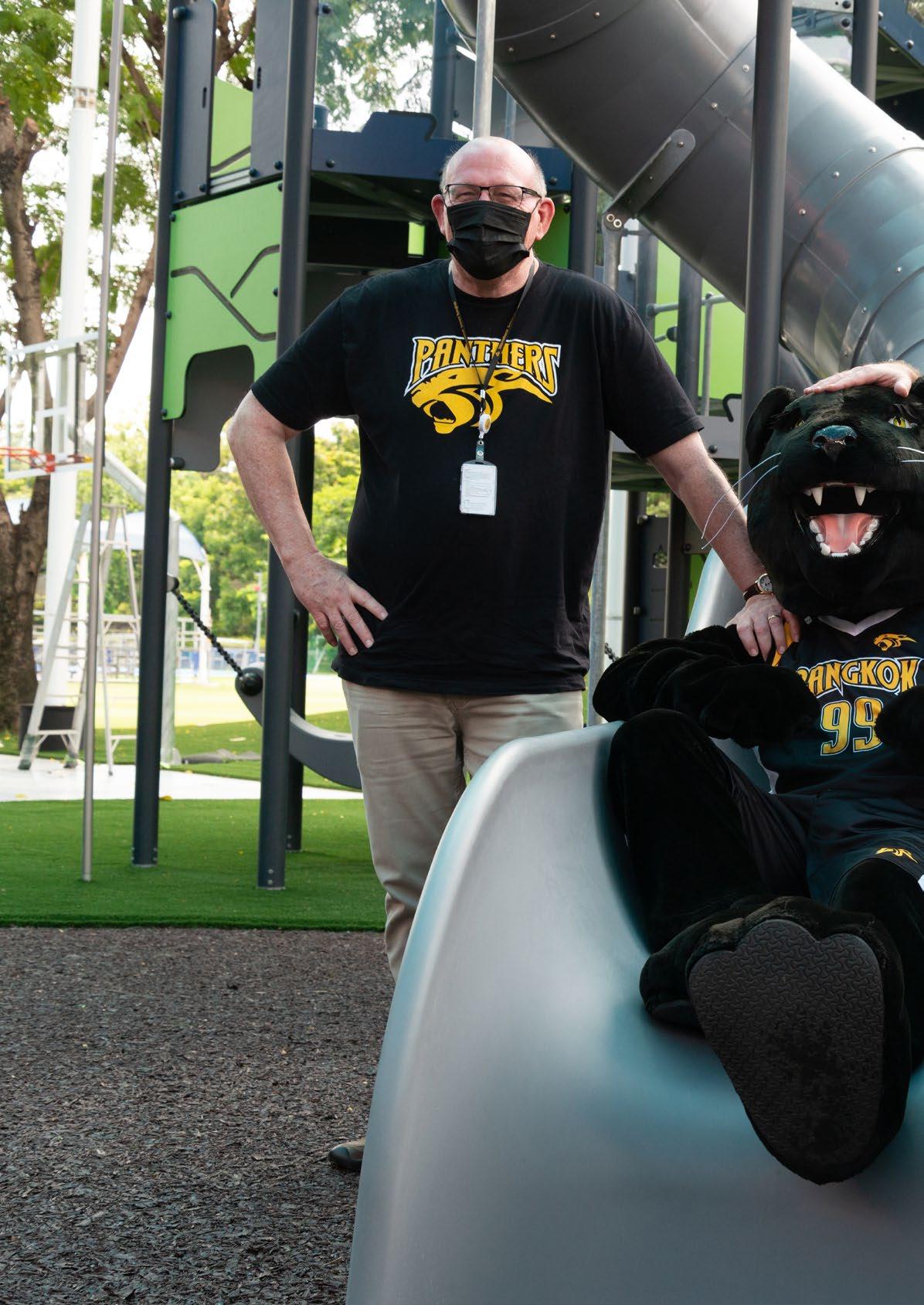
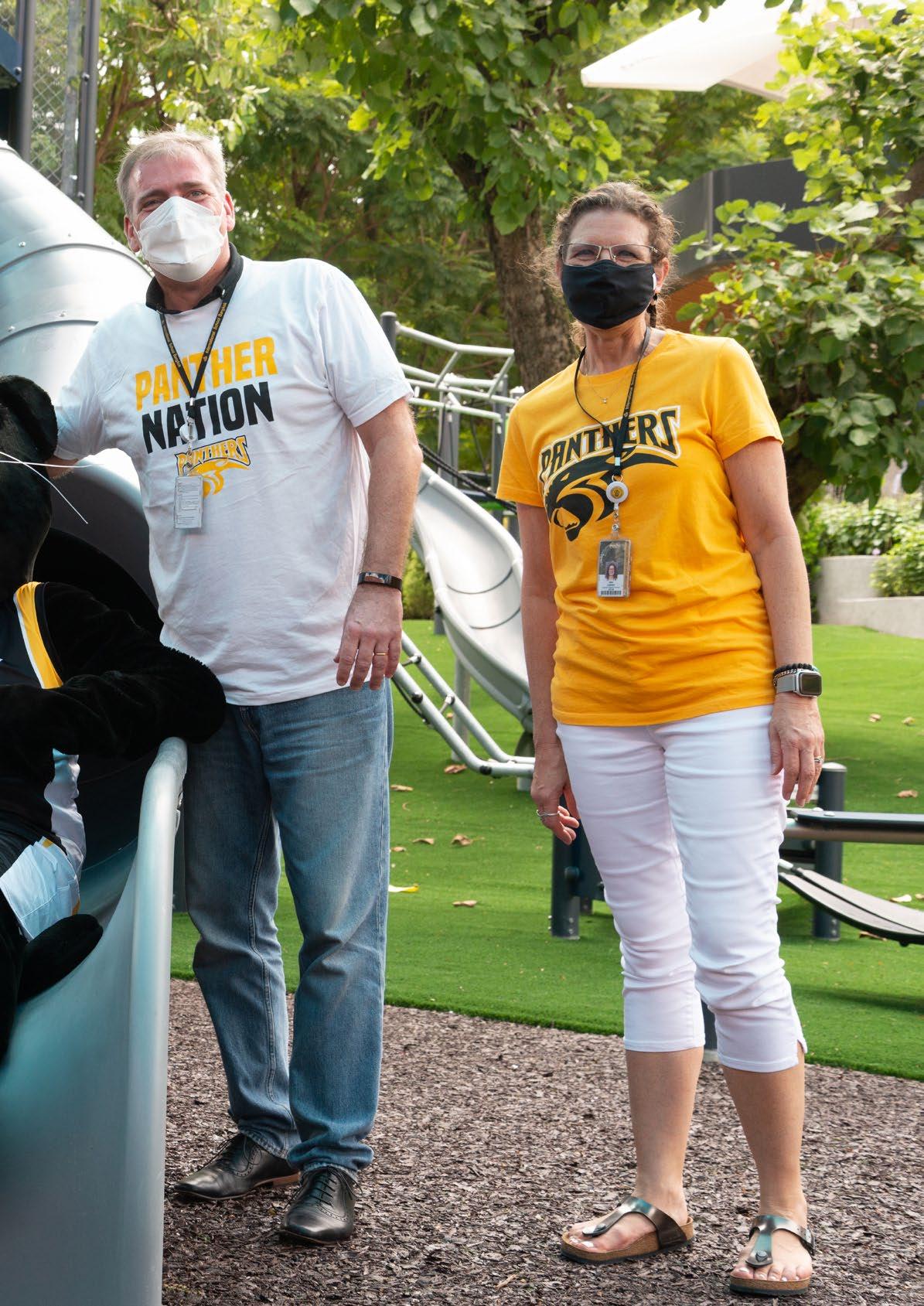

Although the continuing pandemic impacted many facets of school life, there are many reasons to be cheerful about the 2021-22 school year. Through significant preparation with respect to safety, International School Bangkok (ISB) was the first day school in Thailand to reopen, and we were able to welcome students back to campus in late September, enjoying a pretty much uninterrupted run until the end of the school year.
With much appreciation, many activities resumed, and we were able to participate in sports with schools in Bangkok. Performances with live audiences also returned, and we were treated to “High School Musical,” “10 Ways to Survive the Zombie Apocalypse,” as well as a host of high-quality musical performances. This year was also the first time in three years that we were able to be on campus until the very end of the school year and, importantly, could hold an inperson graduation for our seniors.
Aside from COVID-19 management, we were able to make several school improvements this year related to student learning. Our Strategic Learning Plan included work on enhancing our abilities with respect to pedagogy, collaboration & teacher efficacy, innovative practices, and using data to improve learning. As we do every year, we also improved the school’s capacity in the areas of curriculum, technology, meeting the needs of diverse learners, DEIJ, our Learner Attributes, and student well-being.
Despite the different learning approaches, we are confident our students made good learning gains this year. We began the year with the International Baccalaureate (IB) results from the May 2021 examination session, and these were very encouraging - with a 100% pass rate for the second year running and an average IB Diploma score of 36.5 with three students scoring a perfect score of 45 and 30 students scoring over 40 points. MAP and ISA results this year were also strong relative to comparable schools, and our graduates have again gained admission into universities and colleges of their choice around the world.
In terms of facility enhancements, the Elementary Makerspace has enhanced the opportunities for our students to demonstrate problem-solving skills, collaboration, design thinking, and creativity. Our new elementary school playgrounds have been enthusiastically welcomed by students, along with the expansion and renovation of the ES cafeteria. For the summer of 2022, our major facilities project will see the first phase of a comprehensive redevelopment of the athletics area, including gyms, fitness rooms, and offices.
I would like to recognize ISB’s Crisis Management Team and the Leadership Team for all of their hard work in ensuring the ISB campus was as safe as possible for this school year. I am also extremely grateful for the dedication and creativity shown by our faculty as they taught in unusual conditions, both virtually and in person. Our students have shown remarkable adaptability and commitment throughout this school year, and our parents have supported the school through all of these difficult months. As they always do, our support staff stepped up magnificently to keep the school running well in challenging times and ensure the strongest safety and hygiene standards. Finally, I would like to recognize the work of the Board of Trustees - a group of 15 current and former parent volunteers who contribute many hours each month to make the best decisions for our students and community.
We are very grateful to our whole community for their continued support, and we look forward to returning to as normal a situation as possible in the not too distant future.
Sincerely,
Dr. Andrew Davies Head of School


This school year was a special one as we commemorated our 70th anniversary. Back in 1950, a group of parents led by Mrs. W.T. Turner, the wife of the U.S. Embassy’s Charge d’Affaires, drew up plans to establish a school for English-speaking children in Bangkok. Utilizing an old wooden building on the grounds of the U.S. Embassy, the International Children’s Center (ICC) opened on May 14th, 1951, with more than 50 students from Grades 1-4.
On August 29th, 1957, the International School Association (ISA) was formed, and the ICC was officially renamed International School Bangkok (ISB). As we continued to expand, we built a new campus at the end of Sukhumvit Soi 15, opening with over 550 students representing 25 different nationalities - the start of a new era for English-speaking children in Thailand. By the next decade, the ISB Panther had made its first appearance on campus, and the student population had grown to over 3,600 students overwhelming the Soi 15 campus and necessitating an additional campus in the Bangsue area of Bangkok.

ISB entered the 1970s with two campuses, numerous activities, clubs, sports, organizations, and a large student body that was active and happy. Some of these programs included the wildly popular “House Games” led by ISB’s dynamic Athletic Director and Head of Physical Education, Mr. P.E. Rajendra., and the ISB Young Internationals, a performance group that entertained audiences across Thailand.
By the 1980s, the money contributed to ISB by the U.S. Government during the Vietnam War meant that we had installed well-resourced science labs and libraries, audiovisual equipment, and support positions such as special education teachers, reading specialists, a school psychologist, and a speech therapist. Thus, even though two-thirds of the student population departed after the war, ISB was still well positioned to be the best international school in Thailand and one of the leading such institutions in the region.

With an improved curriculum, a state-of-the-art educational program, expanding activities and athletics program, and an increasing student population, ISB entered the 1990s once again facing a familiar problem: the campus was too small for its vision of ISB in the 21st century. So we built a new award-winning campus on a large piece of land in Pak Kret, Nonthaburi. We moved into the campus in January of 1992, and the beautiful, brand-new facilities became home to an abundance of athletic, fine and performing arts activities that were previously impossible. These programs have become an integral part of the community and only increased as the years went by, with new and exciting offerings on the horizon.
In recent years, ISB has continued to modernize and revitalize our Pak Kret Campus, adding a state-of-the-art golf facility, new playgrounds, new athletics facilities, and a cultural center. We’ve been in our Pak Kret campus for 30 years and Thailand’s premier international school for over 70 years - enjoy this snapshot of our campus “Then & Now!”

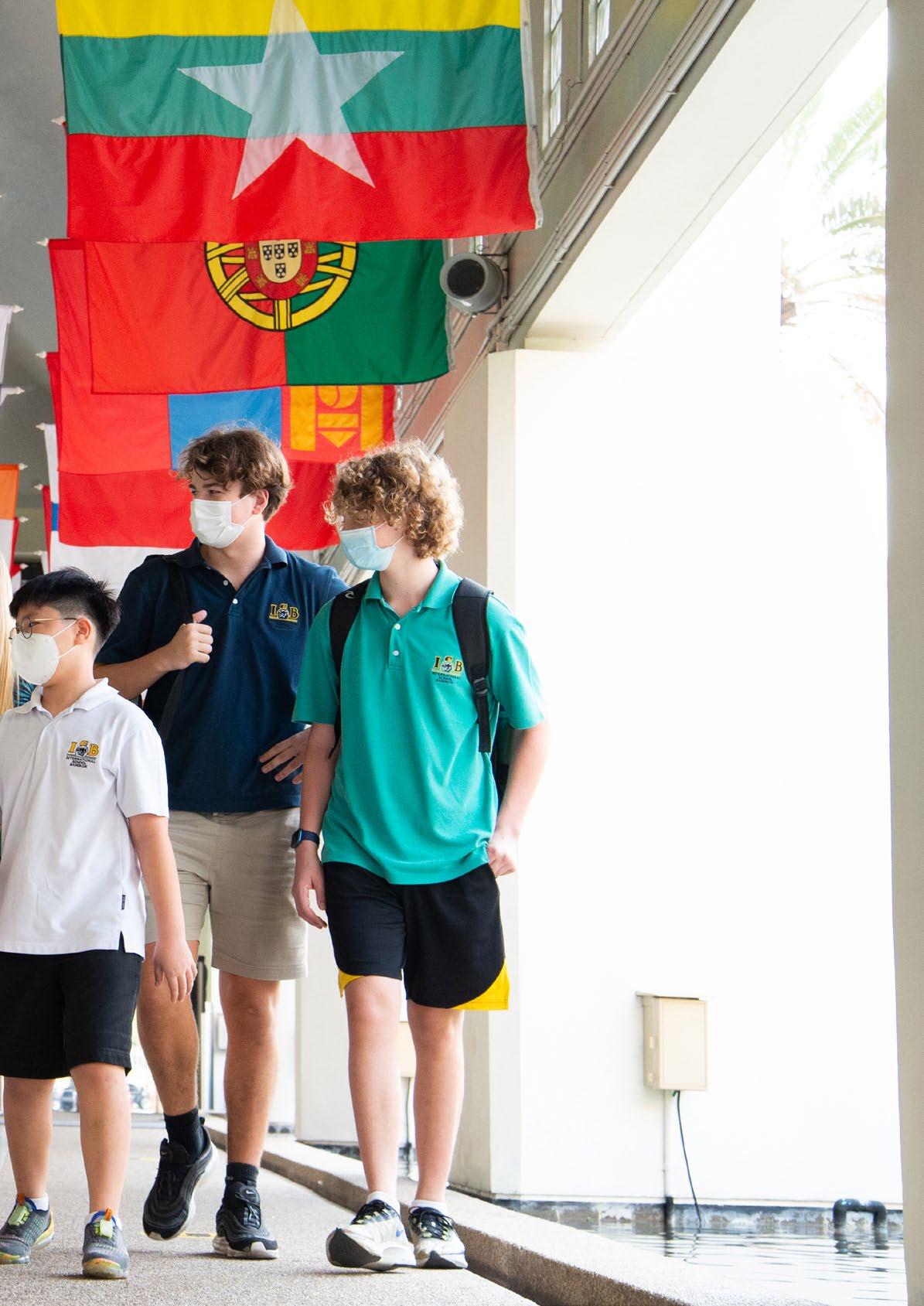
Enriching communities through the intellectual, humanitarian, and creative thoughts and actions of our learners
One of the most important things about ISB is the clear, unwavering dedication to our mission, attributes, and values. For us, as an organization and as a community, these ideals shape our thoughts and actions and guide our way into the future.
Our ISB Learner Attributes and Values were developed through a multi-year research and development initiative that led us to define the essential skills - beyond knowledge and academic abilities - that our students need to be successful and make a difference in the world during and beyond their time at ISB.
ISB identified six learner attributes that are of particular importance today, thus we provide students with opportunities to be:
Creative Developing new and imaginative ideas that have impact.
Globally-Minded Invested in the world and its people, embracing diversity, and aware of the impact of actions on local and global communities.
Adaptable Responding appropriately and with flexibility to ambiguous or changing circumstances.
Socially-Intelligent Recognizing personal emotions and those of others, managing responses productively and collaborating effectively.
Value-Driven Guided by our ISB Values, promoting positive citizenship and fostering personal meaning.
Self-Managing Independently directing, monitoring, and evaluating personal behaviors, goals and time.
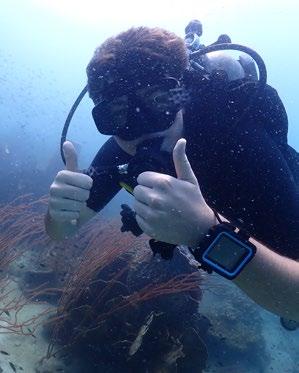
Throughout the past months, as the world changed and we lived together through a global pandemic, our ISB community continued coming together through conversations about belonging diversity, equity, inclusion, and justice. As we have seen the shattering images from Ukraine, our students and community have also risen to these social challenges. They use their voices, skills, and passions to make a difference through their creative, intellectual, and humanitarian thoughts and actions.
Throughout the months of virtual learning, hybrid learning, COVID-19 quarantines, and changing travel requirements, our community has exemplified our Attributes and Values. The changes in learning models and classroom setup have created the need for our students to be adaptable to different ways of learning, communicating, and socializing. Our teachers have adapted learning opportunities to fit virtual education for all students and to find ways to include students both in the classroom and at home. Students also learned to self-manage their after-school activities when parents were unable to come on campus - even our littlest Panthers were finding their way to swimming, dance, and all kinds of creative activities.
Our student service organizations continued to grow our students into globally-minded and caring citizens of the world through their activities in support of local communities struggling through the pandemic (e.g., iCare, the ES Cuddle Donation, etc.). Groups of students also demonstrated their care and responsibility for the world through their weekend clean-up trips, where one group worked to prevent more than a thousand kilos of plastic and garbage from entering the ocean by cleaning khlongs (canals) within the city.
Students exhibited social-intelligence by teaching their teachers about inclusivity through workshops on identity and sharing their stories and experiences. Other student clubs worked on building awareness about Down Syndrome and Autism through activities and informational posters.
The ISB Values and Attributes help define the actions and beliefs that underpin what it means to be a caring global citizen. Through the exceptional challenges of these past months and years, we have seen these principles living and growing throughout our ISB community.


ISB’s community stands out not only in how diverse it is but also in how our community members are the initiators and active participants of exceptional projects that serve to improve the lives of others.
Students, faculty, staff, and parents demonstrated great care, creativity, adaptability, and commitment in the 2021-22 school year with a variety of fundraisers, service projects, and partnerships with local charities in Thailand. With restrictions still in place owing to the continuing pandemic, together, we decided to make our focus local, to support one another and our neighbors.
Whether leading food and donation drives, virtual tournament fundraisers, or creative mask competitions, our community showed just how value-driven they are through their efforts to better the lives and circumstances of those around them.

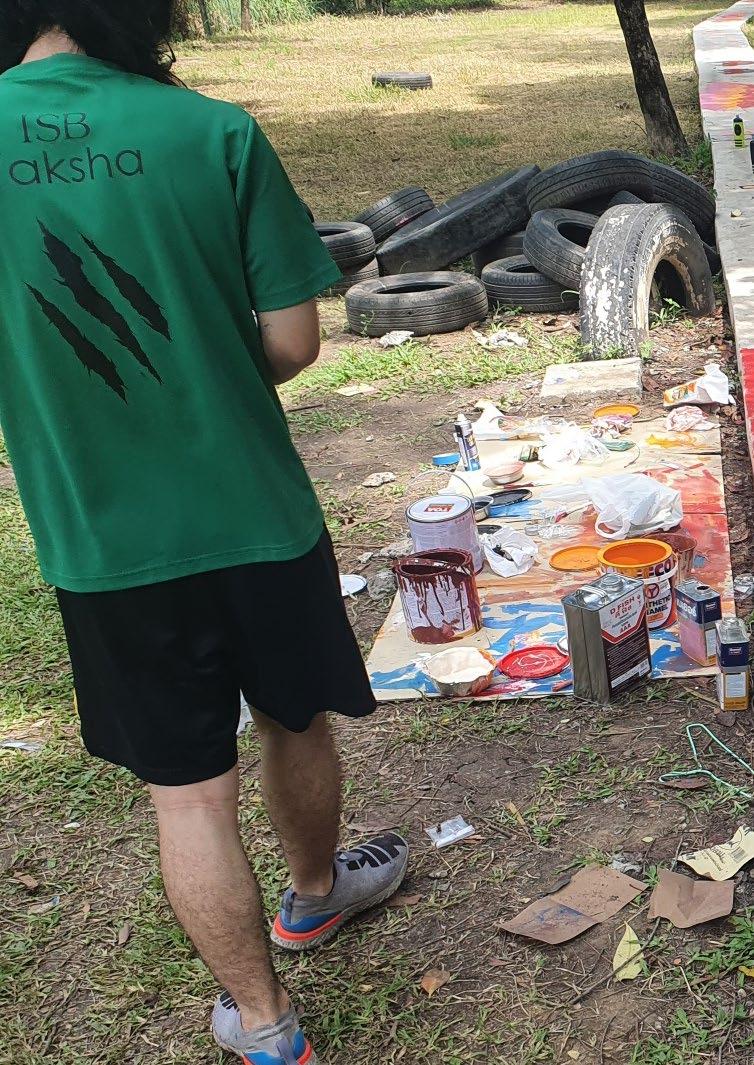
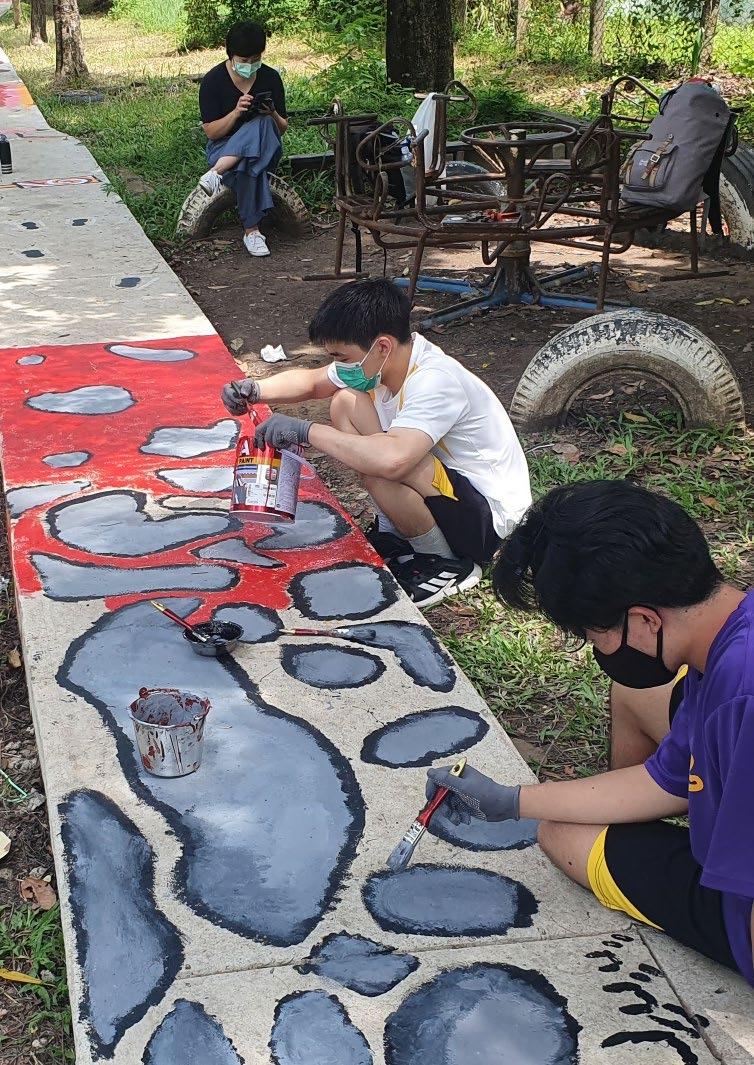




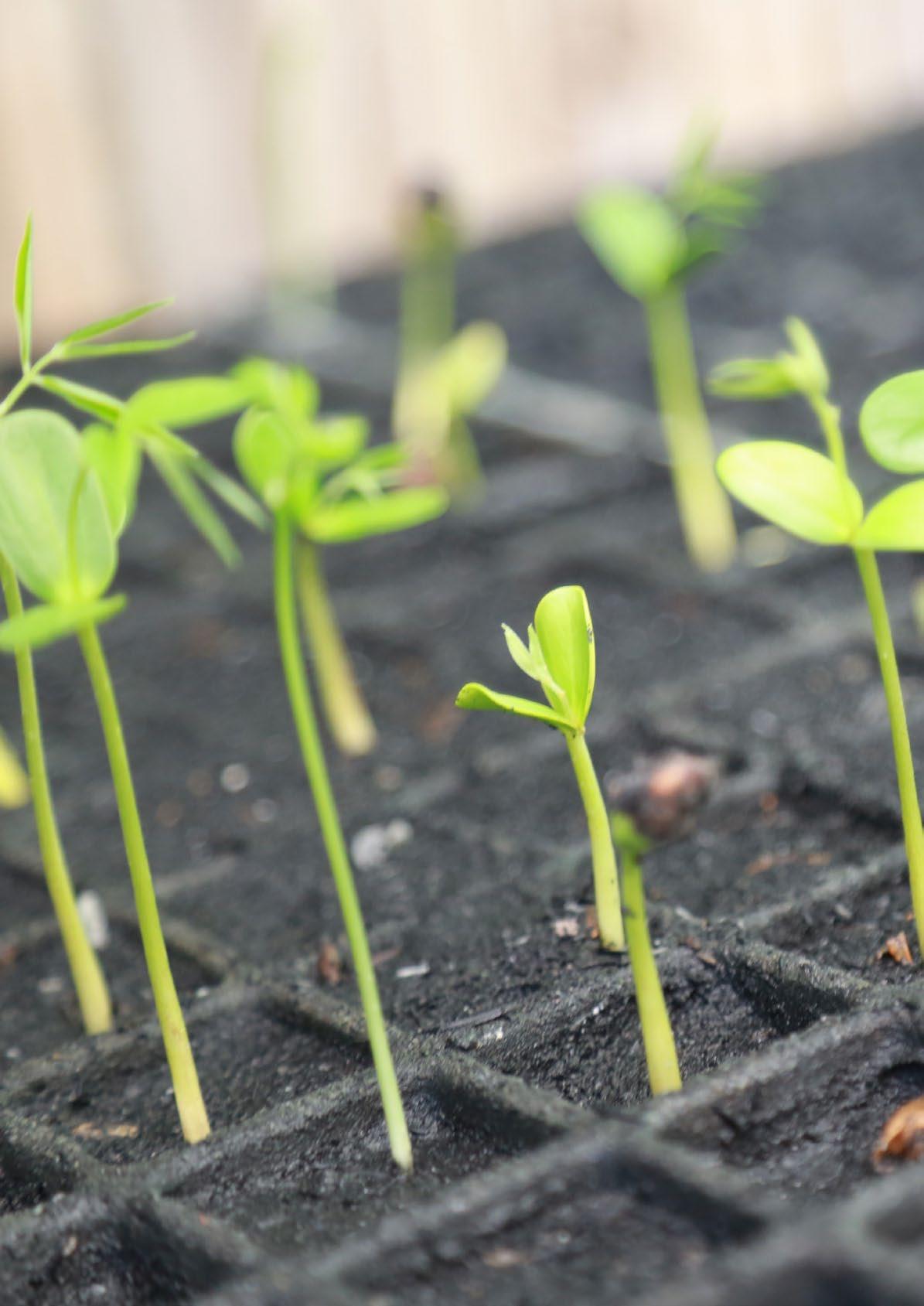
At International School Bangkok, it is essential for students to recognize the relationship between what they learn in class and real-life world experiences. Service trips embody wellness, care, gratitude, global-mindedness, and being value-driven. They provide opportunities for students to immerse themselves in character building, comfort stretching, and applied-learning experiences.
One of our new partnerships for middle school field trips this year included a Thai NGO that works to educate students about the issues of deforestation, human-animal conflict, and establishing safe and protected habitat areas and green corridors for flora and fauna to flourish.




Our Grade 7 group actively participated in reforestation efforts by seeding plants on ISB sponsored land donated to OurLand through an all-school fundraiser called Jumping For Elephants. These pieces of land will help create an essential green corridor connection from the adjacent national park to a river source that will, in turn, reduce wildlife deaths and reforest land and reduce carbon footprints.
Students learned to meditate in nature on this trip with the silent nature walk exercise. Students safely walked one by one through a stretch of forest with the simple instructions to be still, stop, listen and take in what they saw around them. They later stood in distanced rows facing a stretch of trees, performing deep breathing exercises, allowing them to experience the peace and tranquility of their surroundings fully. They learned how to identify various insects and plants through the excellent guides at OurLand and simply experienced nature. Students gained a new and respectful understanding of their responsibility to work towards protecting wildlife and creating sustainable solutions to affect change, awareness, and education in their peers and futures.
As part of the trip, students were told to leave all digital devices at home and have a complete digital detox. Not only did this create a necessary break from technology, but it encouraged students from all backgrounds and friend groups to interact and socialize. By the end of the trips, we saw many new friendships had developed.
Even though our teachers shifted from virtual learning to hybrid learning to everyone back in person, their professional development and dedication to their ongoing growth never wavered.
This year, professional development focused on creating ways for every student to access their learning by constructing opportunities and removing barriers. We spoke specifically about how we take a translanguaging stance to support all students in using all of the languages in their repertoire to access learning.
Teams spoke explicitly about how students develop their digital competencies and work toward mastering the ISTE standards (International Society for Technology in Education) through integrated, project-based, and inquiry-based learning. Teachers and teams collaborated to design meaningful opportunities for students to find problems, design solutions, test those solutions, and iterate to improve. These learning activities not only stressed our academic standards but promoted student voice and choice and built upon our Values and Attributes.
At International School Bangkok, we are proud to be able to hire the best educators in the world. They are true professionals who genuinely care for their students and are dedicated learners themselves.






Some of our Panthers are with us from their very first day of school until they walk across the stage at graduation. Others have attended a different school every year. Every learner brings with them a unique background, valuable skill set and interests to the school. Each one is a leader in their own right, and no matter how long they have been at our school, each becomes a member of our evergrowing family.
Student leadership can be seen throughout ISB, from pre-k to high school. For example, this year, our youngest Panthers explored who they were as learners, recognizing their own strengths and areas of growth. They then took on leadership roles, identifying how they could help their peers develop their skills. Students carried out weekly rotating classroom jobs, assumed sports captain positions, coached their classmates, and learned how to self-manage their energy levels and emotions.
As students progress at ISB, they are provided increasingly more leadership opportunities. In our middle school, students led through service work, leadership councils, leadership roundtables with administrators, and the capstone action projects around allyship. When this school year began virtually, our MS Ambassadors led social lunch groups for cohorts of new students to connect and integrate new students into the middle school. We offer students real-world leadership experiences through an inclusive model where all students can choose to lead without being elected.
In the fall of 2021, our high school students attended a series of virtual leadership modules with Inspire Citizens, a group of leaders who design student-centered learning experiences for sustainable development and global citizenship. The modules supported high school club and council leaders to explore and practice empowering leadership skills. Then together, the team co-created and cofacilitated a student leadership retreat for the newly selected club officers in April 2022.
Our students’ authentic learning experiences and leadership opportunities take them far in life. They have gone on to become successful scientists, dancers, mathematicians, authors, illustrators, CEOs, politicians, humanitarians, innovators, activists, musicians, entrepreneurs, athletes, and life-long learners who are passionate and caring global citizens.


Alumni events, typically part of our school calendar, once again had to be postponed or canceled due to the pandemic. Nonetheless, our alumni were determined to remain active and connected.
Our local alumni stayed in touch via social media, keeping up-to-date on the news from ISB and Thailand. While in-person alumni events were impossible this year, our locally-based alumni look forward to a return to normalcy next school year. Overseas, the ISB Network Alumni Association did its part in keeping alumni connected as the organization, led by Reunion Director, David Wilkerson, hosted a very successful reunion in July in Tucson, Arizona. Additionally, Janet Lowe Craven (Class of 1981) once again hosted frequent Zoom meetings throughout the year, keeping ISB alumni all across the globe connected to each other and the school. Janet’s focus this year was on Thai food and ISB Lady Panther athletics.
The ISB Alumni Office kept busy compiling more than 70 stories from alumni worldwide featuring talented alumni in the arts, business, athletics, politics, and community service. Our Alumni Office has continued to extend its reach by connecting with ISB alumni via Facebook and LinkedIn. Scores of our alumni have reconnected to ISB this year, and with a new, dedicated website on the horizon, we anticipate reaching even more Panthers during the 2022-23 school year.
During the 2021-2022 school year, we also endeavored to celebrate our 70th anniversary as the school that was to become ISB officially opened its doors on May 14, 1951. Our Marketing & Alumni Office took on various projects to celebrate this milestone, including a blog series telling the 70-year history of ISB through seven videos lovingly presented by our ISB Alumni Coordinator, Harold Albert. Each one highlighted a decade or so of ISB’s rich history. Not only did they reach hundreds of ISB alumni around the globe, but they will also serve as a written and audio-visual history to be enjoyed by future ISB Panthers.

Another project that commemorates 70 years of ISB is our 70 Stories book. The idea for this book was borne out of discussions between ISB Director of Marketing, Harriett Gething, and ISB Alumni Coordinator, Harold Albert. The goal was to collect 70 stories from alumni (students and staff)snapshots of times at ISB that created memories to cherish forever. Whether it’s tales of snakes in Soi 15, school being closed during the Gulf War, Pancho’s tacos, memorable IASAS matches, something called ‘The Big Stick,’ or ‘How I met your Mother at ISB’ love stories, it’s clear how much this school means to so many people and the lasting impact it has had on so many lives.
Thailand is and always will be my home away from home. The people, the smiles, the beauty… it is just all so wonderful, and I find myself daydreaming about it on a regular basis.
I will always be proud to have been a part of this great school.
While my childhood was certainly not void of obstacles, when I look back on those early years, I am filled with gratitude and awe for the anchor that ISB provided.
So, when I tell my students that ISB is home, I mean that ISB has given me all of the things that we tend to associate with that word - happiness, joy, and perhaps most important of all, family.
Here are some excerpts from the 70 stories book

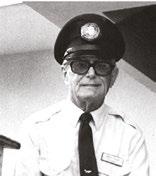





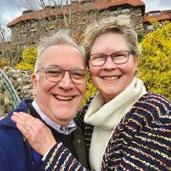
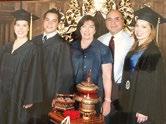
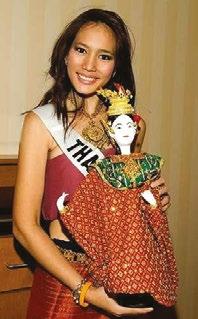










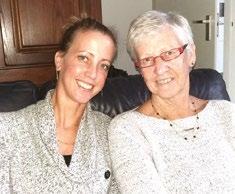


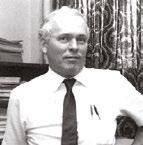




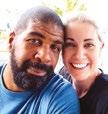








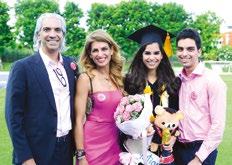
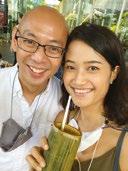
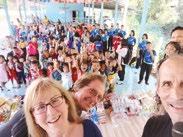










The purpose of the Parent Teacher Association (PTA) is to advance, through parent engagement, the Mission, Vision, Attributes, and Values of the school. The main objective is to encourage parental involvement and community building through events and activities that help bring the International School Bangkok community together.
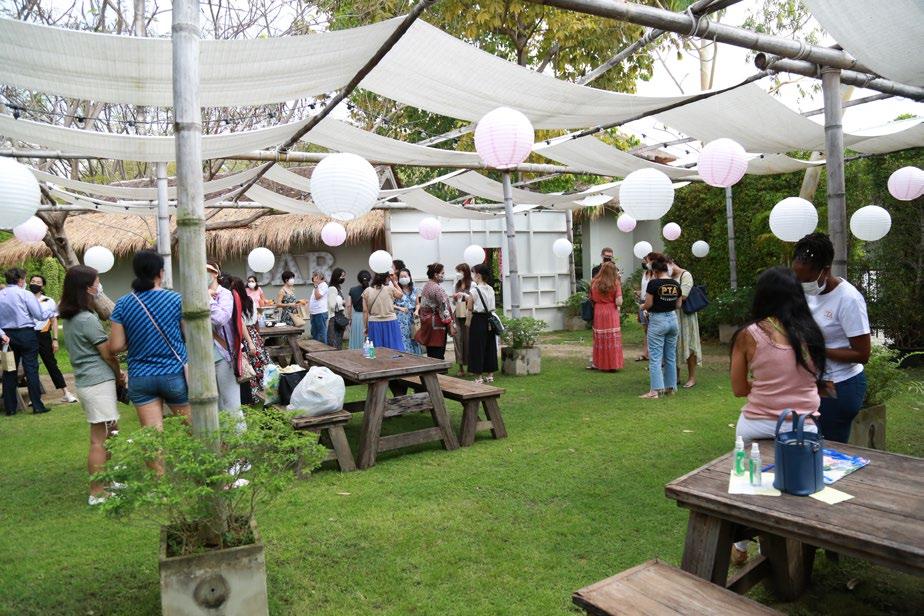
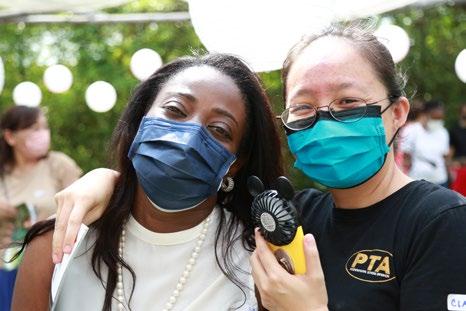
While their usual activities were limited this year, we give our heartfelt thanks to the 2021-22 PTA Board members for their tireless efforts.
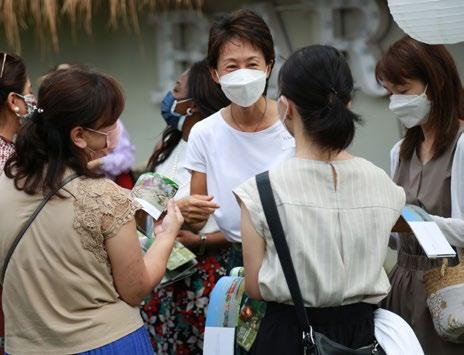

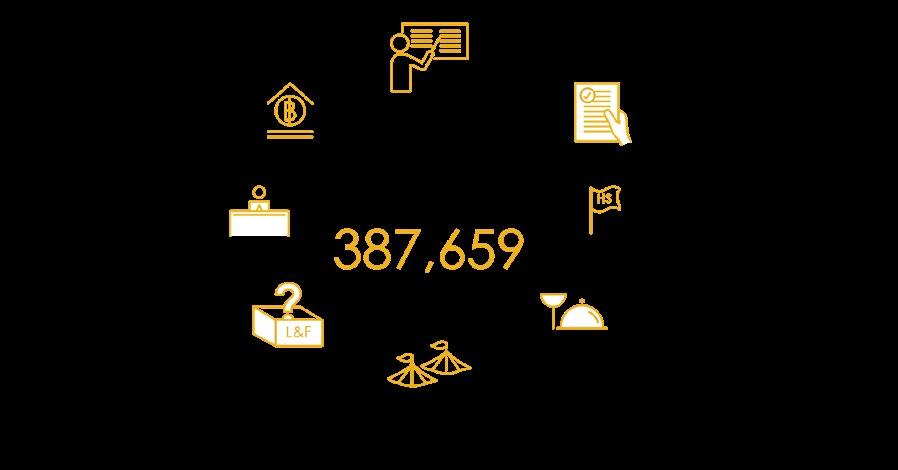
International School Bangkok’s (ISB) Booster Club provides extra financial support to students participating in arts, athletics, and clubs while promoting school spirit across campus. Twenty parents and three administrators made up the Booster Club Board, along with their dedicated volunteers.
Again, this year, the COVID pandemic hindered the ability to raise funds. The volunteer workforce also shrank significantly due to parents’ limited access to campus for most of the school year. However, the dedication of Booster Club Board members combined with extended hours in the Booster Hut, online sales, Spirit Tent, and Panther Pops revenues allowed Booster to donate over THB 702,000 for the 2021-22 school year.
As ISB celebrated its 70th anniversary, Booster’s focus this year was continuing to promote “Panther Pride” in our community. They introduced new spirit wear in the Booster Hut, including a new gray hoodie and t-shirt commemorating ISB’s platinum anniversary. Boosters also worked closely with several student-led organizations by donating merchandise from “The Hut” for club initiatives such as Project Panthers Cancer Research Project, Athletics Council, Share the Meal, and the middle school CC Challenge.
We continued our partnership with the PTA and contributed to a grant to improve the rock climbing facility in the new gym. We also made a monetary contribution to support our “littlest panther,” Evelyn, as she continued her battle with cancer.
As the campus begins to open up more to the parent community, the number of volunteers is growing. With a renewed sense of excitement, we look forward to getting back to normal and celebrating the outstanding accomplishments of our student artists, musicians, athletes, and clubs.
12,000 U13-15 End of Season Celebrations
5,000 Thai Staff Fund
3,000 Robotics Club
8,600 Name Plaques for CC & MUN
168,000 New Recognition Boards for Athletics
18,050 Booster Hut Merchandise Donations
2,375 ES Choir & ORFF Ensemble
68,800 Graduation
Thai Baht (THB)
10,000 Legs 4 Legs Dance HS
Donations
65,000 Friends of Evelyn, Joint Grant with PTA 60,000
100,000 Banquets for CC/MUN (Semester 1&2)
6,000 HS Service Fund Mini calendar
25,000 HS/MS Play
150,500 HS Athletics Banquets (Season 2-4)

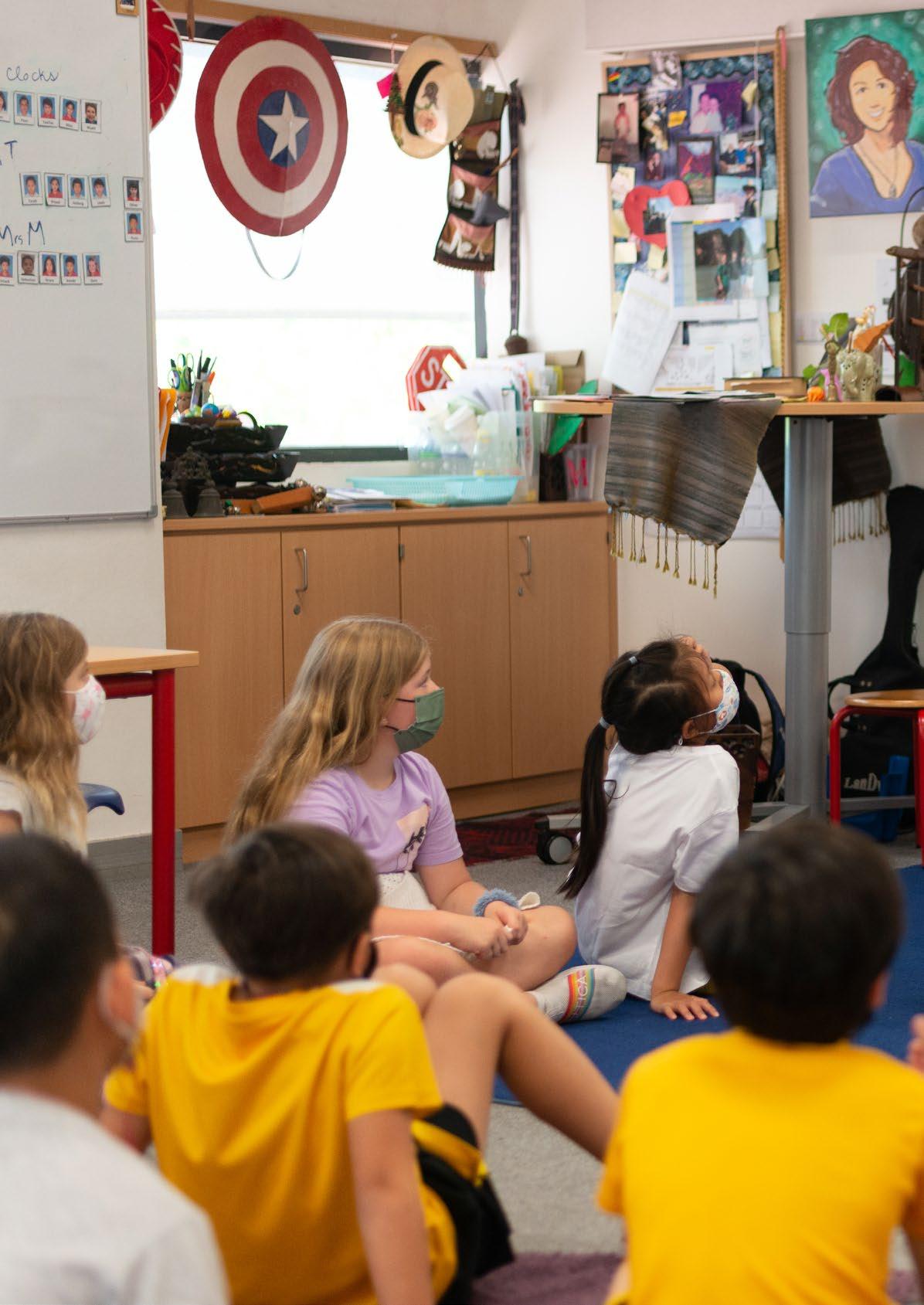
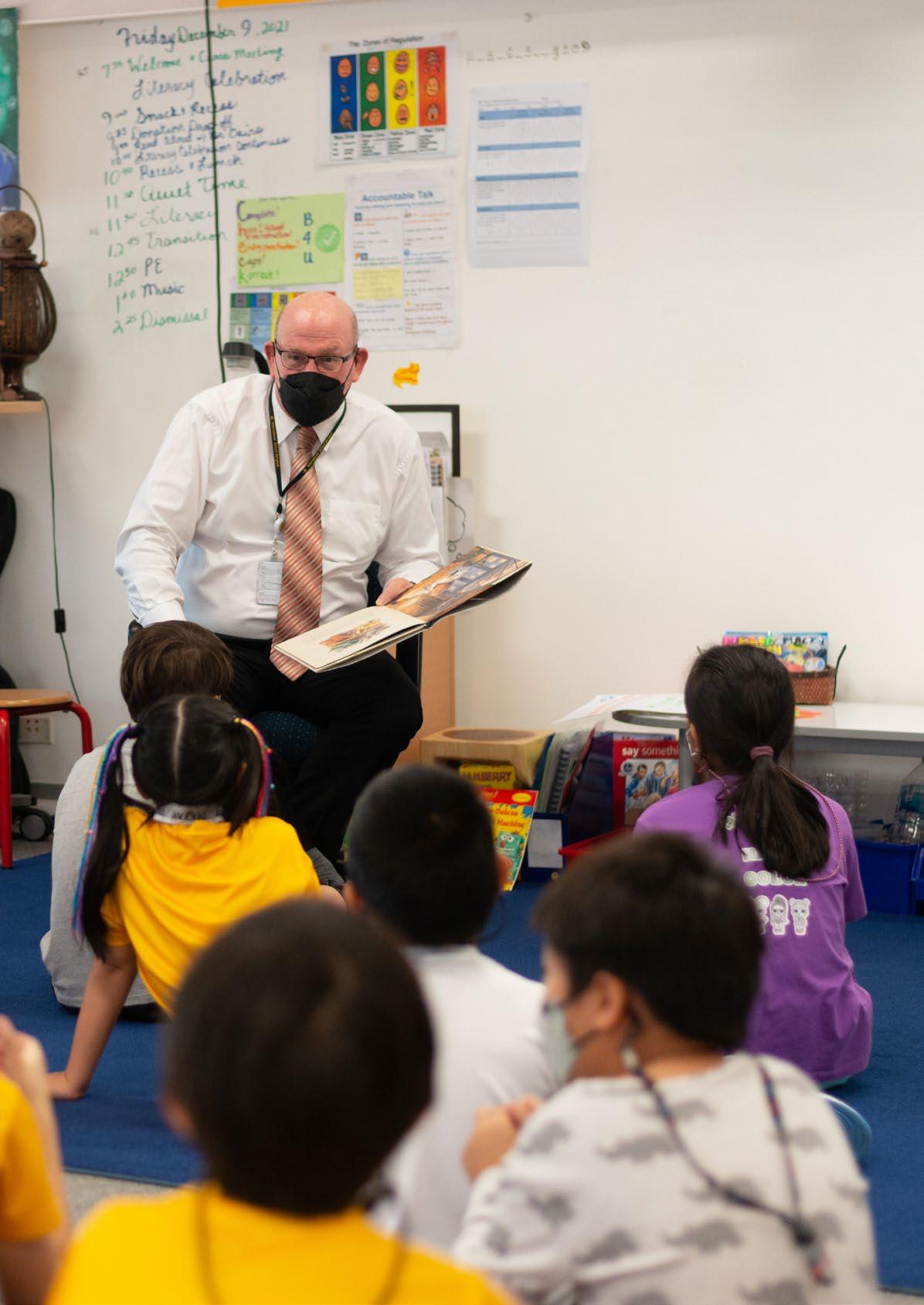
The International School Bangkok Board of Trustees (BOT) consists of 15 trustees – of which up to 11 are elected by the International School Association (ISA) members and up to six appointed persons. The BOT’s role is to set medium and long-term strategies, support and provide guidance to the Head of School, and ensure the school’s short, medium, and long-term financial stability. The Board also ensures that we are true to the ISB Mission: to inspire students to achieve their academic and personal potential; be passionate, reflective learners; become caring global citizens; and lead healthy, active, and balanced lives.
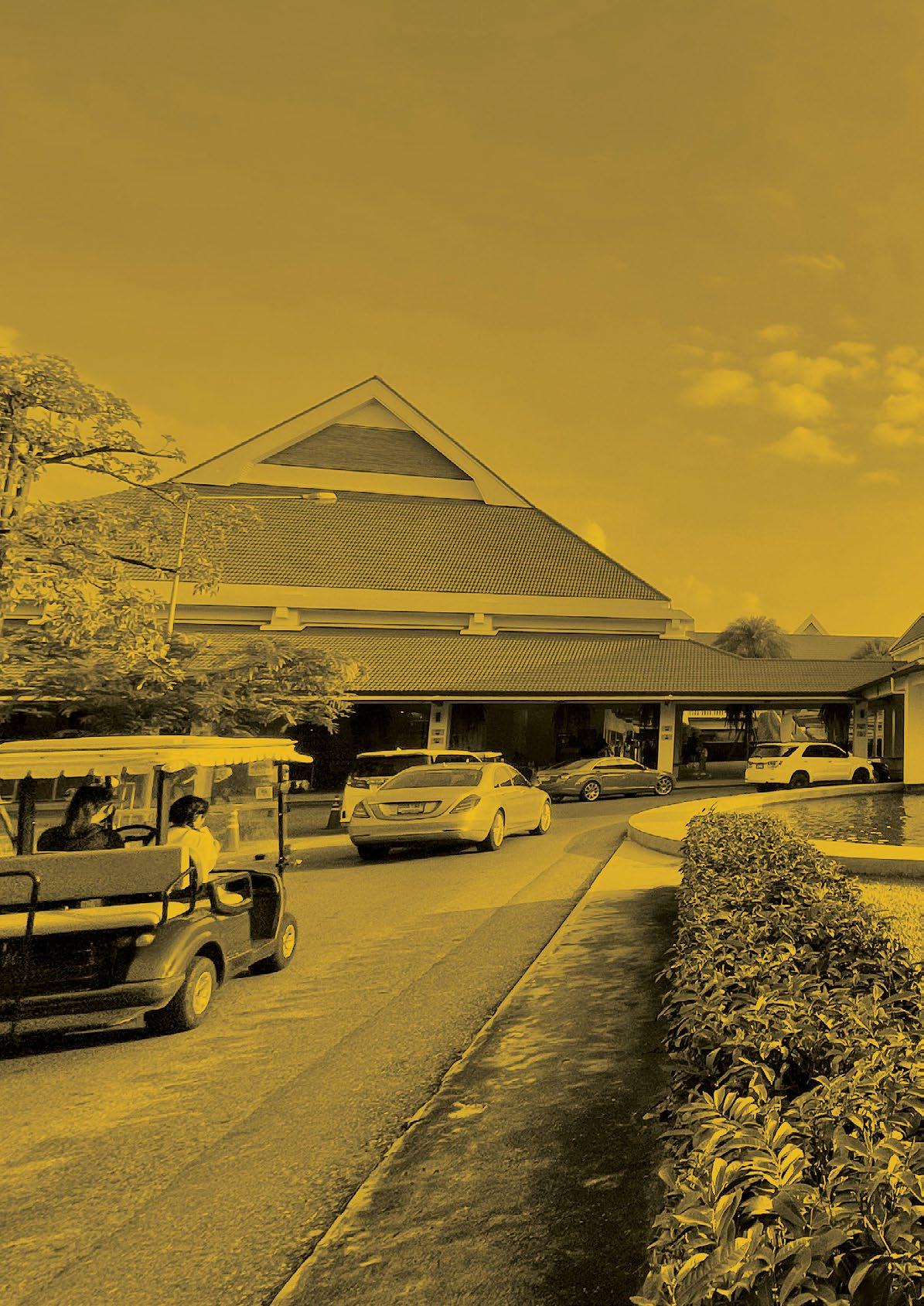
ANDY RICHTER CHAIRMAN. MANAGING PARTNER OF AN INTERNATIONAL LAW FIRM
VICE CHAIR. BOARD MEMBER RANGANA ABDULLA
TREASURER. FOUNDING PARTNER OF A PRIVATE EQUITY FIRM SORAVIT CHAIROJ
MAES SUWANTRA SECRETARY. ADVOCACY ADVISOR, UNITED NATIONS
MARY ANN MORSE
BOARD MEMBER.
IRA BLUMENTHAL BOARD MEMBER. FOUNDING PARTNER OF A LAW FIRM AND OTHER BUSINESSES
ANDY CHAN BOARD MEMBER. CFO ADVISOR AT POLAR BEAR MISSION (“FRESHKET”)
GURDIST CHANSRICHAWLA BOARD MEMBER. SENATOR TO THE THAI PARLIAMENT
BOARD MEMBER.
JOHN HEINECKE BOARD MEMBER. COO, MINOR FOOD
KARN KARUHADEJ BOARD MEMBER.
BOARD MEMBER. NITAWAN LEOPHAIRATANA
JUNIPER NEILL BOARD MEMBER. DEPUTY MISSION DIRECTORUSAID REGIONAL DEVELOPMENT MISSION FOR ASIA (RDMA)
DR. VORAPOL SOCATIYANURAK BOARD MEMBER. EXECUTIVE BOARD, THE WHARTON SCHOOL, UNIVERSITY OF PENNSYLVANIA, USA
TIM BULOW VICE CHAIR. COO, MINOR EDUCATION
DR. PRATHIP CHIARAVANONDOur highly skilled Leadership Team includes a wide range of positions. Each person plays an integral role in maintaining the very best in international education here at ISB.
DR. ANDREW DAVIES HEAD OF SCHOOL
DEBI CASKEY DEPUTY HEAD OF SCHOOL FOR LEARNING
MARC DE VRIES DEPUTY HEAD OF SCHOOL / CHIEF FINANCIAL OFFICER
USA SOMBOON
HEADMISTRESS
JUSTIN ALEXANDER HIGH SCHOOL PRINCIPAL
ANDY VAUGHAN HIGH SCHOOL DEAN OF STUDENTS
JUSTYNA MCMILLAN HIGH SCHOOL DEAN OF ACADEMICS
DENNIS HARTER MIDDLE SCHOOL PRINCIPAL
CINDY PLANTECOSTE MIDDLE SCHOOL VICE PRINCIPAL
MICHAEL ALLEN ELEMENTARY SCHOOL PRINCIPAL
SARAH FLEMING ELEMENTARY SCHOOL VICE PRINCIPAL
JEFF SCOTT ELEMENTARY SCHOOL VICE PRINCIPAL
JENNIFER DELASHMUTT
DR. KEITH COLLINS
CHAD BATES
DIRECTOR OF CURRICULUM & PROFESSIONAL LEARNING DIRECTOR OF STUDENT SERVICES
TECHNOLOGY DIRECTOR
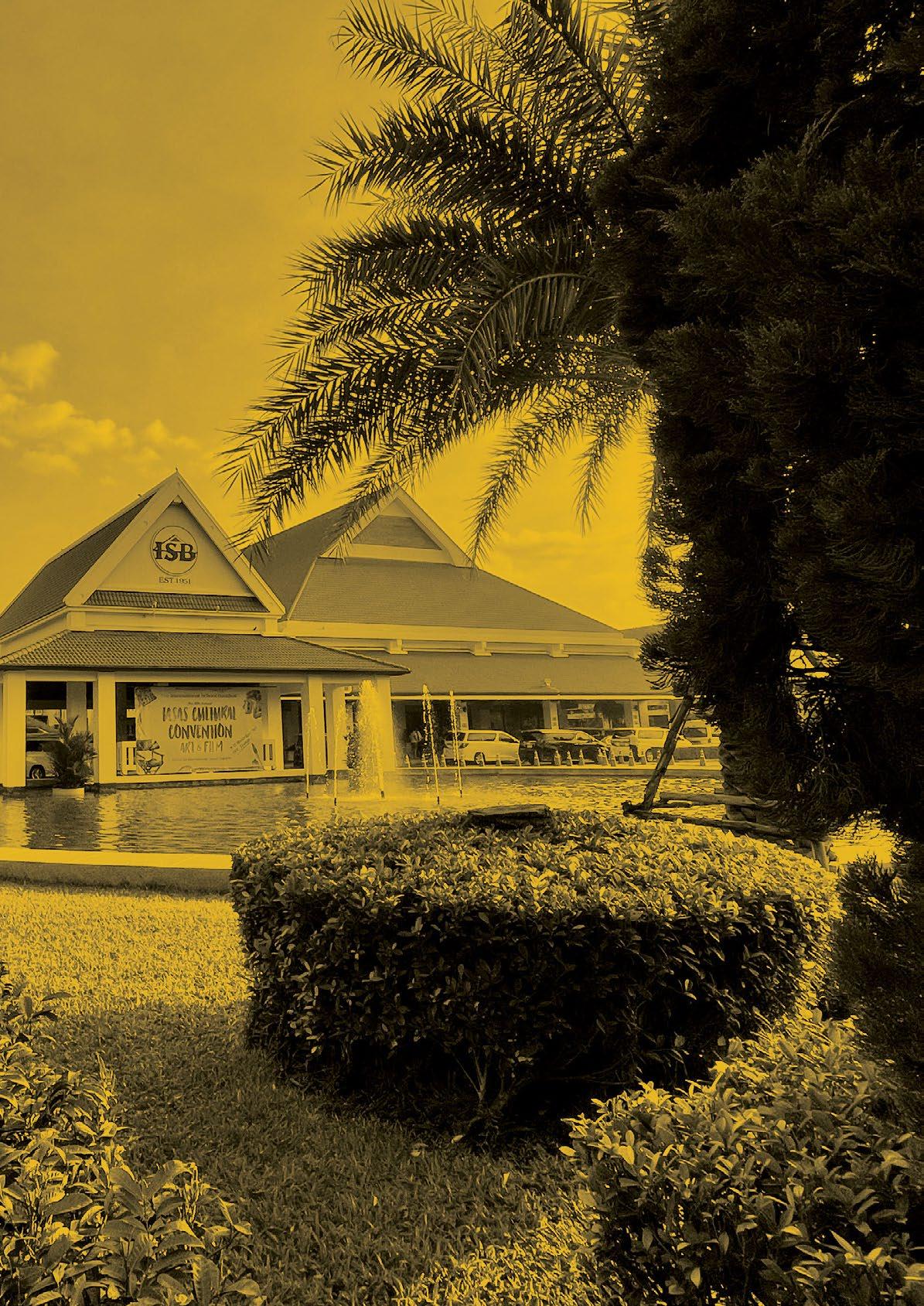

Elementary School, Middle School & High School
The 2021-22 school year, our third consecutive school year impacted by the pandemic, provided opportunities for students to connect and learn via different instructional models. Students started the year virtually, where daily lessons and weekly community events kept everyone engaged in their learning from home.
Students came back together on campus during a short-term hybrid model before the full reopening of campus. There was so much excitement and appreciation for being on campus, especially as students could enjoy the beautiful new elementary playgrounds (how great are the zip lines?!) and our incredible new cafeteria.
Congratulations to all of our Elementary School Panthers for their flexibility and adaptability. Students, families, faculty, and staff were very supportive as models evolved. Everyone continued to focus on ensuring that each child felt a strong sense of belonging and moved their learning forward. Students felt a deep connection to the community and learned virtually, in hybrid, in-person, and everything in between!
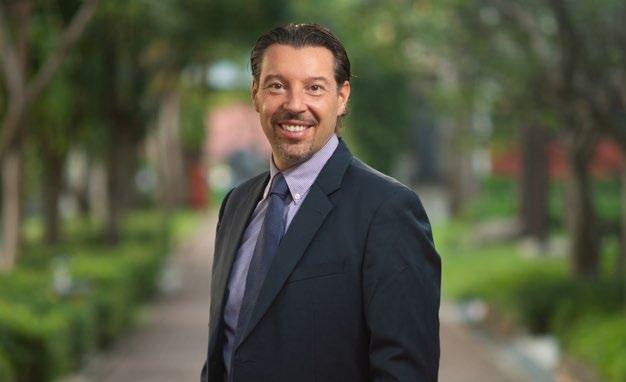
The middle school community once again demonstrated its adaptability and commitment ensuring a year of growth, learning progress, and care despite the challenges posed by the ongoing pandemic. Our teachers emphasized the importance of building relationships at the start of the year while in virtual learning. This proved helpful as we adjusted to hybrid learning, a combination of online and in-person learning. By the time we returned fully to learning on campus with safety measures in place, students already had relationships and classroom routines in set.
A greater sense of normalcy was felt in the second semester with our Athletics & Activities returning. We were able to reintroduce our Wild Panthers program while maintining safety measures and adapting to changing COVID circumstances, providing our students with trips to the Environmental Wilderness Campus for their outdoor education units. We were also excited to introduce new environmentally focused trips, with students traveling around Thailand to engage in hands-on learning about the conflict between human and environmental needs. Through it all, our students and teachers continued progressing with our learning program while overcoming challenges and COVID interruptions.
Middle School provided rich learning experiences, first online, and then in and out of the classroom as we adapted to the ever-changing COVID landscape and safely moved learning forward throughout the year.
Ensuring that every student feels like they belong and are contributing members to the ISB community is essential, regardless if they are learning virtually or in person.
”-Dennis Harter, Middle School Principal -Dr Michael Allen, Elementary School Principal
With the pandemic impacting a third year of learning, our high school students and faculty were challenged once more to experience being adaptable while maintaining their enthusiasm and motivation for learning in an online setting. While this wasn’t easy, we are fortunate to have committed teachers and counselors and excellent resources to support students both on campus and at home online.

The High School placed a high value on making connections and building relationships at the start of the year (when online), which held us in good stead when we finally returned to oncampus learning in November. Students hit the ground running and were able to slide back into face-to-face learning with much excitement and enthusiasm.
In the second semester, we returned to more normal activities and events, with athletics games, concerts, and performances being held. The sense of school spirit and togetherness is becoming more apparent, and there is much to look forward to for the 2022-23 school year.
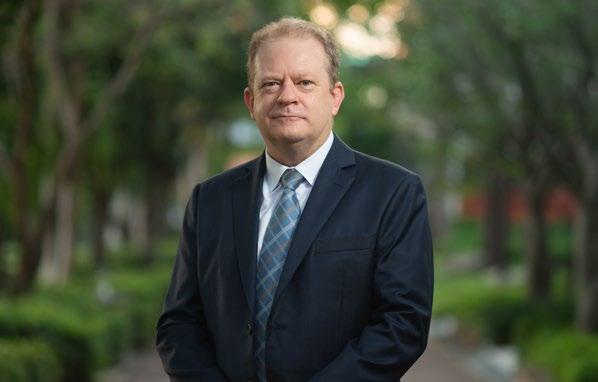

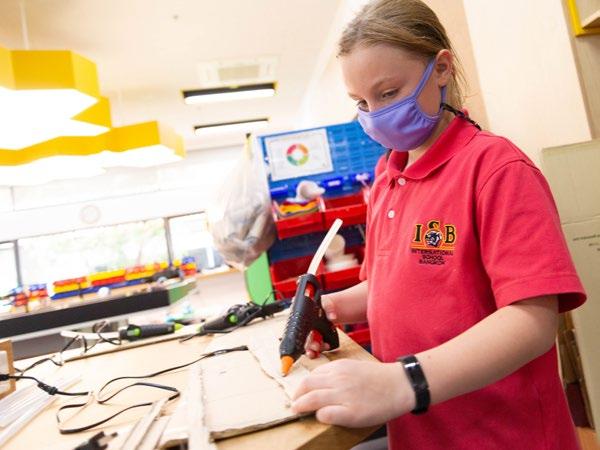

Providing support and full access to learning in a caring manner was a priority for our high school faculty as they started the 2021-22 school year, and that continued right through the year. We are looking forward to a year of learning in person!
-Justin Alexander, High School Principal
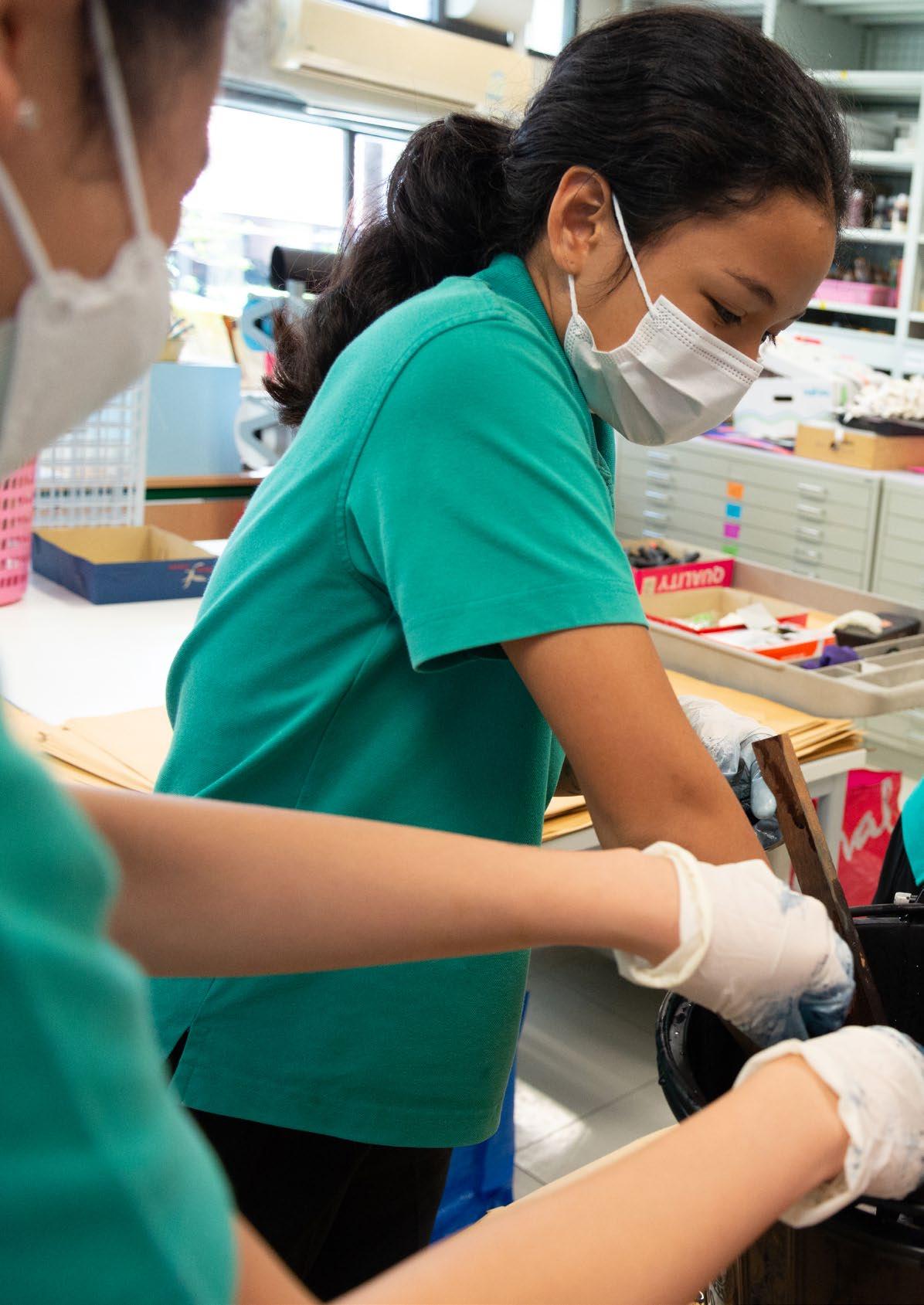
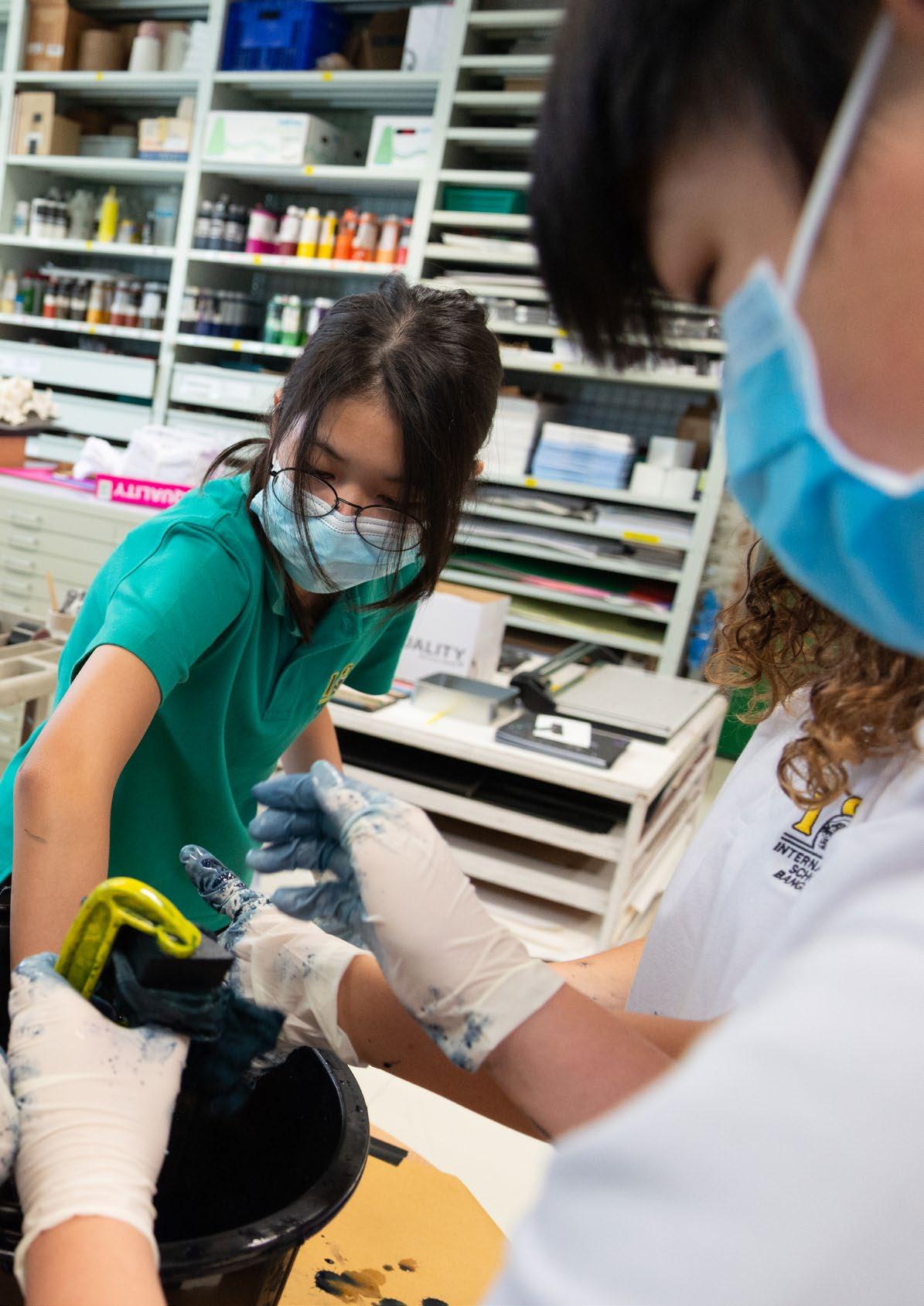
At International School Bangkok, we carefully select and use standards that are recognized worldwide which connect with our ISB Mission, Vision, and Values. Our standards are enhanced by our Definition of Learning and our Learner Attributes. Together, this supports our goal to equip our students competently to thrive and contribute with impact to our ever-changing world.
Our curriculum is based on leading best practices and research. ISB’s learning standards focus on the development of the whole child with expectations that are not only skill and content-based but also concept and understanding-based. In designing learning experiences for students, we connect these concepts and skills to our ISB Values and Attributes to support them as individuals and prepare students for their next steps.
The custom-designed curriculum combined with our approach to learning are paramount to creating an environment where students can learn how to learn. At the beginning of the year, faculty generate opportunities to get to know their students as learners and dedicate time to collaborating as teams and reflecting on student learning. This collaborative and reflective process informs our curriculum review and development in real-time.
We create learning experiences for our students using a backward design framework. We begin with the end in mind, with the long-term goals (beyond high school and university) that we would like our students to engage with and inquire about. From there, we design performance tasks by asking ourselves, “What should learners be able to do with their learning?”
Assessment design and feedback have our Learner Attributes and Definition of Learning at the forefront. Furthermore, we use various methods to assess learning and what students can do with their knowledge. Exams and standardized tests assess the “right now,” or what students have learned up to a certain point. Authentic projects and tasks engage students in owning and showcasing what they know and can do. Students are encouraged to apply and transfer their learning in diverse contexts.
This year, the entire ISB faculty engaged in learning experiences focusing on inclusive practices and nourishing a culture of belonging. We worked with Dr. Jo Kim, a senior lecturer in Harvard’s Graduate School of Education. Dr. Kim’s areas of expertise are cultural studies, diversity, and educational equity, to name a few. We also engaged with Dr. Katie Novak, with six different sessions for all faculty during the first and second semesters. Katie supported our understanding of universal design for lear ning (UDL) guidelines and principles. This work supports teachers as they design learning experiences where students are empowered and unnecessary structural barriers are removed for all students to provide access to the learning goals.
Finally, we honed in on three areas that remove barriers and generate access to learning: translanguaging, technology, and our own identities and stories as members of our learning community. Building on Dr. Kim’s talks, we engaged in sessions together, sharing stories of equity, inclusion, and diversity. We learned about translanguaging ecology and the power of multilingualism, and inquired into our student standards for technology with the new lens of virtual school.
A few of our other highlights and achievements include:
• Adapting learning experiences for students while in virtual school and hybrid learning
• Engaging with our PK-12 Philosophy and Guidelines Review Cycle
• Inquiring into concept-based learning with our MS and HS math teams
• Exploring provocations and the use of learning spaces in early childhood
• Engaging in grade-level team literacy learning loops KG-G5
• Reviewing our research-focused units of study through the lens of inquiry in G6-10
• Launching virtual and face-to-face student leadership modules
• Co-hosting Learning 2 Asia Virtual Conference
• Conducting schoolwide interviews and using protocols to inform opportunities for post-COVID learning
• Refining and auditing our G6-10 Health and Wellbeing program through a project-based lens



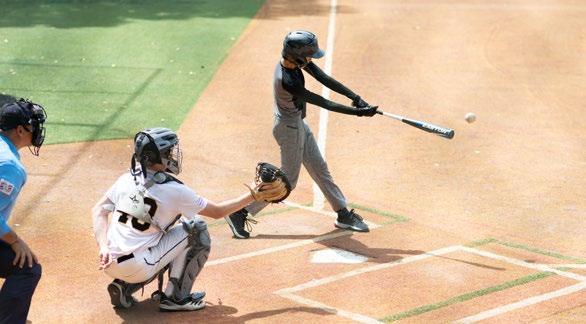

Experiential learning is the process of learning through experience and is more specifically defined as “learning through reflection on doing.” As a learning community, we have gone through an inclusive process to identify our Learner Attributes and Values that align closely with our Mission, Vision, and Definition of Learning. We know that authentic experiences both on and off-campus allow students to practice these skills, strategies, and dispositions. “Learning by doing” and then pausing to reflect on individual and collective learning experiences enables students to engage with the learning process, discover who they are as learners, and promote their innate curiosity.
As part of our collaborative structures at ISB, we continued to review and reflect upon our units of study to bring experiential learning experiences into the core curriculum during the school day. Our elementary and middle school students could explore our learning spaces at our Environmental Wilderness Campus (EWC). In addition, our high school students were able to participate in DELVE (Discover. Explore. Learn. Volunteer. Enrich) trips and experiences this year. The DELVE program is designed to be volunteer-based and environmentally conscious. Our students are actively taking action from iCare to the ServICE conference to community art projects.
In our makerspaces, science labs, and media rooms, our primary and secondary students engaged with our ISB Design Cycle to provide a framework for developing problem-solving skills and practicing an iterative mindset. All across our campus, we continue to review and refine our approach to curriculum integration that dissolves the boundaries between the conventional disciplines and organizes teaching and learning around the construction of meaning in the context of real-world problems or themes.

A playground isn’t ever just a playground. Play is crucial to children’s physical, social, emotional, and cognitive development. It allows students to interact with their environment differently, have novel experiences, rebalance their energy, learn by doing, and have fun along the way.


Engaging, creative, and adaptable activities reinforce this learning. We’ve recently renovated and opened additional play spaces: our “Parkour Park” and “Sky Park” for elementary and middle school students and our brand new “Panther Park” for pre-k and kindergarten students. There’s something for everyone, from treehouses to zip lines, towers, climbing structures, running stream, building blocks, and more.



As the children play with one another, they quickly form novel and crucial connections in their brains. Playtime incorporates social cues like intention and reciprocity, which involve complex neural exercises and communication. Engaging in these exercises, making those connections, and practicing languaging will help them succeed in the future as they develop.
One of our Elementary School teachers, Zoe Trodden, reflected on the new Panther Park, “We have seen the phenomenal impact this space has had already. Lots of collaboration, peer-to-peer learning where older children are helping younger children, and the language that’s been going on to support one another, it’s fantastic...the language piece and how we communicate with one another - that really transfers back into the classroom! So the spaces support each other, and really, this is an outside classroom. It has a positive impact on their whole learning.”
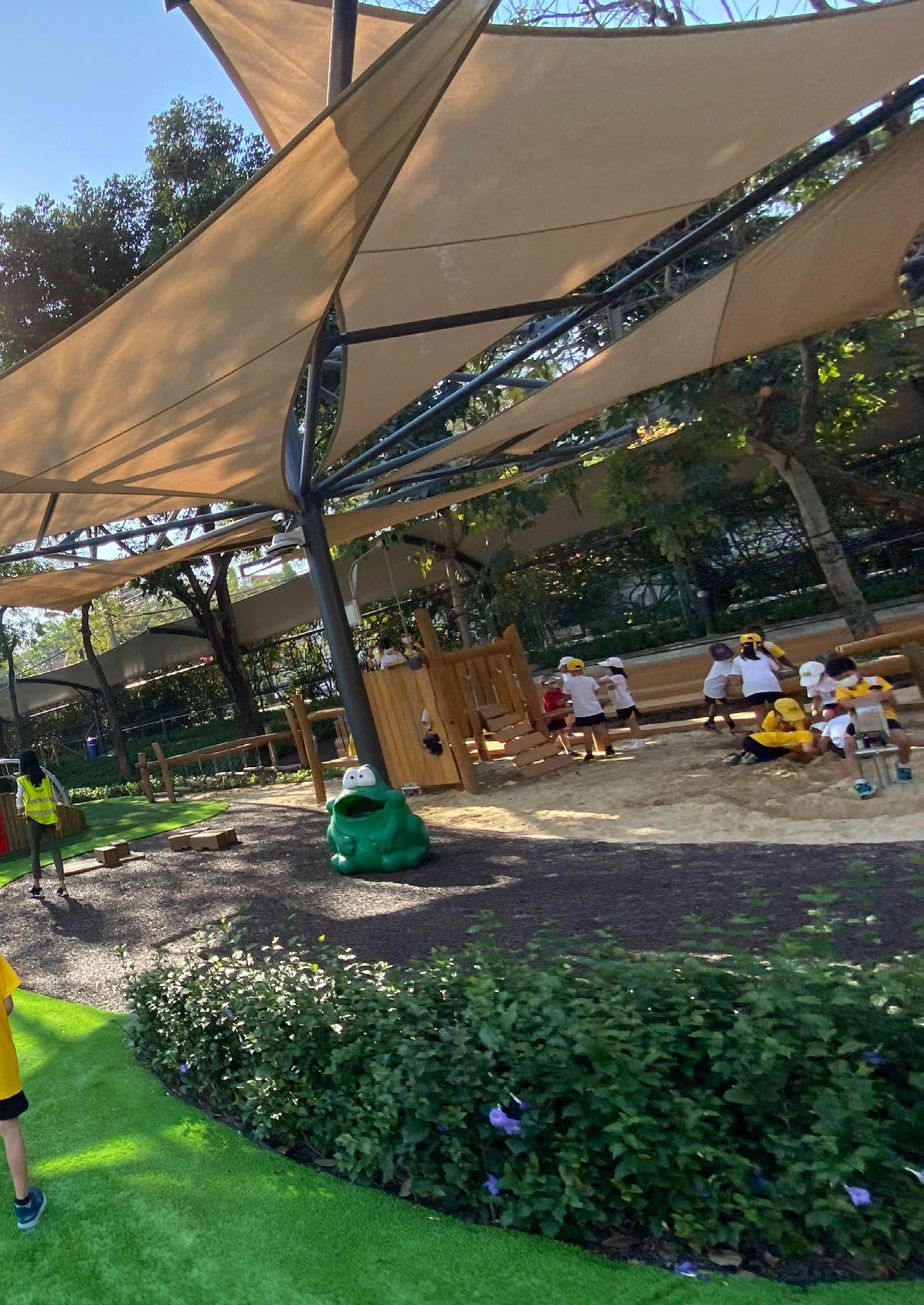
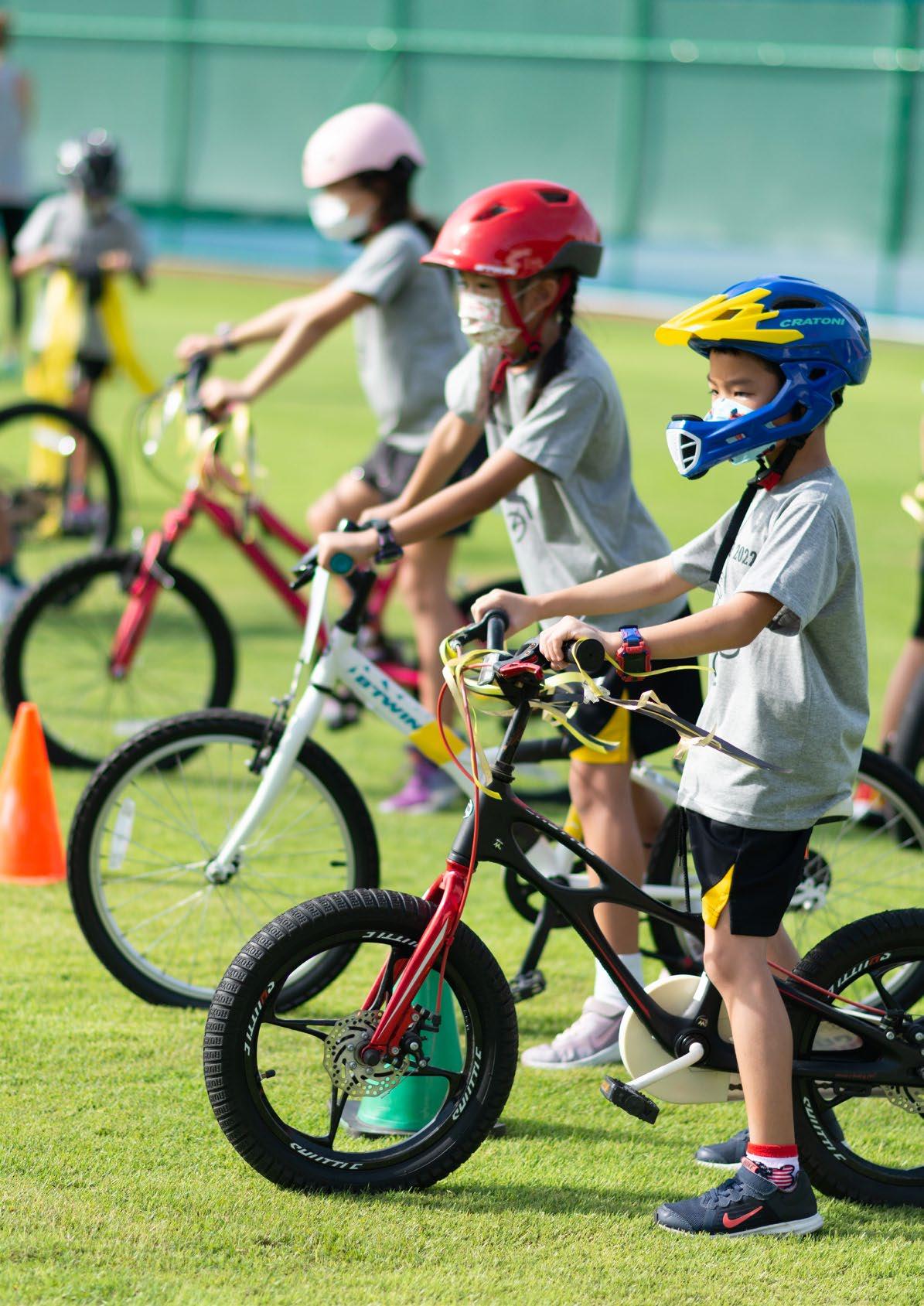
Panther Activities at ISB is a pay-to-play program that complements our academic, athletic, arts, and activities programs at ISB. Classes include everything from baseball, dance, and tennis to music, languages, and new this year, Panther Xtreme, which offered students the opportunity to participate in board sports such as skateboarding, skim-boarding, surf-skating, and wakeboarding. Each of our offerings provides active, creative, diverse, and collaborative opportunities for all students. Panther Activities has something for everyone, with nearly 150 coaches and 4000+ registrations annually.
Panther Activities’ response to the ever-changing COVID-19 regulations this past school year perfectly exemplified adaptability and creativity, two of our ISB Learner Attributes. When the 2021-22 school year started in ISB Virtual School and transitioned to a hybrid model, Panther Activities adapted, got creative, and asked an important question: what can we do instead? Together with ISB Athletics, they collaborated to offer alternative opportunities to students in both virtual and hybrid environments.
Returning to school in a virtual setting, students needed more ways to connect. So Panther Activities shifted how they offered activities to encourage engagement, relationship, participation, and positivity. For example, what previously would have been provided separately as ballet, jazz, and tap became dance with a focus on moving, engaging, relating, and having fun. This shift provided students a social platform to connect and check in with each other, their coaches, and mentors.
When school shifted into the hybrid model, Panther Activities adapted again, offering students an opportunity to do a sport or activity with a smaller diverse group instead of the usual teams and larger groups. While the activities, groups, and sizes may have looked different in the hybrid model, the intent was always the same - to keep kids active and connected. We are grateful for the journey of developing activities for students despite the circumstances brought by the pandemic; a return to normal activities later in the year brought with it elation and perhaps a greater appreciation for what had been missing - active, creative, diverse, and collaborative in-person opportunities for all kids!
Panther Activities offered in the 2021-22 school year included:


At International School Bangkok, learning through the design, fine, and performing arts is valued for all students from pre-K through Grade 12. With over 50 arts-dedicated faculty, staff and instructors, 27 music practice rooms, 12 performing arts classrooms, seven visual arts studios, two theaters, two art galleries, a makerspace, a film studio and an invention center, there is plenty of support for every child to explore their own creativity.
Despite limitations imposed by the pandemic, celebrations of learning in the arts took place throughout the year in the form of both virtual and in-person exhibitions, concerts, plays, dance performances, festivals, conventions, and a few field trips, including a trip to Dallas, Texas USA by our high school robotics team for the VEX World Championships. Go Steel Panthers!
Other highlights included our first musical production since 2019 and hosting the 2021 IASAS Cultural Convention for Art & Film. Although hosted online, the convention was anything but virtual, with multiple guest artists present throughout the three-day event providing live workshops for all six schools’ participants direct from the artists’ own studios via Zoom.
Altogether, ISB students connected with upwards of 25 guest artists this year through lectures, workshops, performances, and festivals, providing invaluable opportunities for our students to learn from and observe practicing artists at work. Three years of postponements resulted in sold-out audiences for ISB’s production of the Disney classic “High School Musical: The Musical,” reminding everyone that truly, “We’re all in this together!”
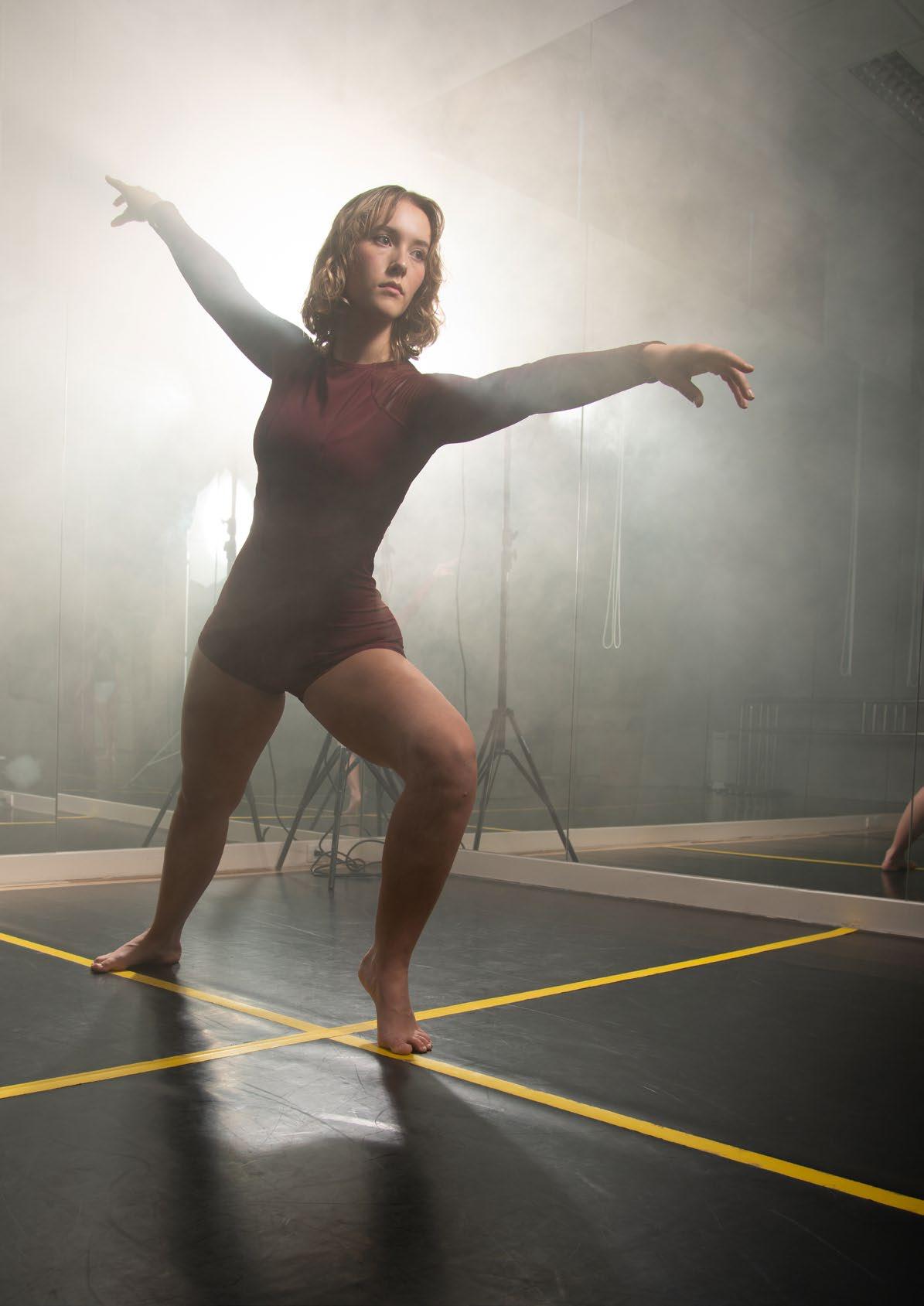
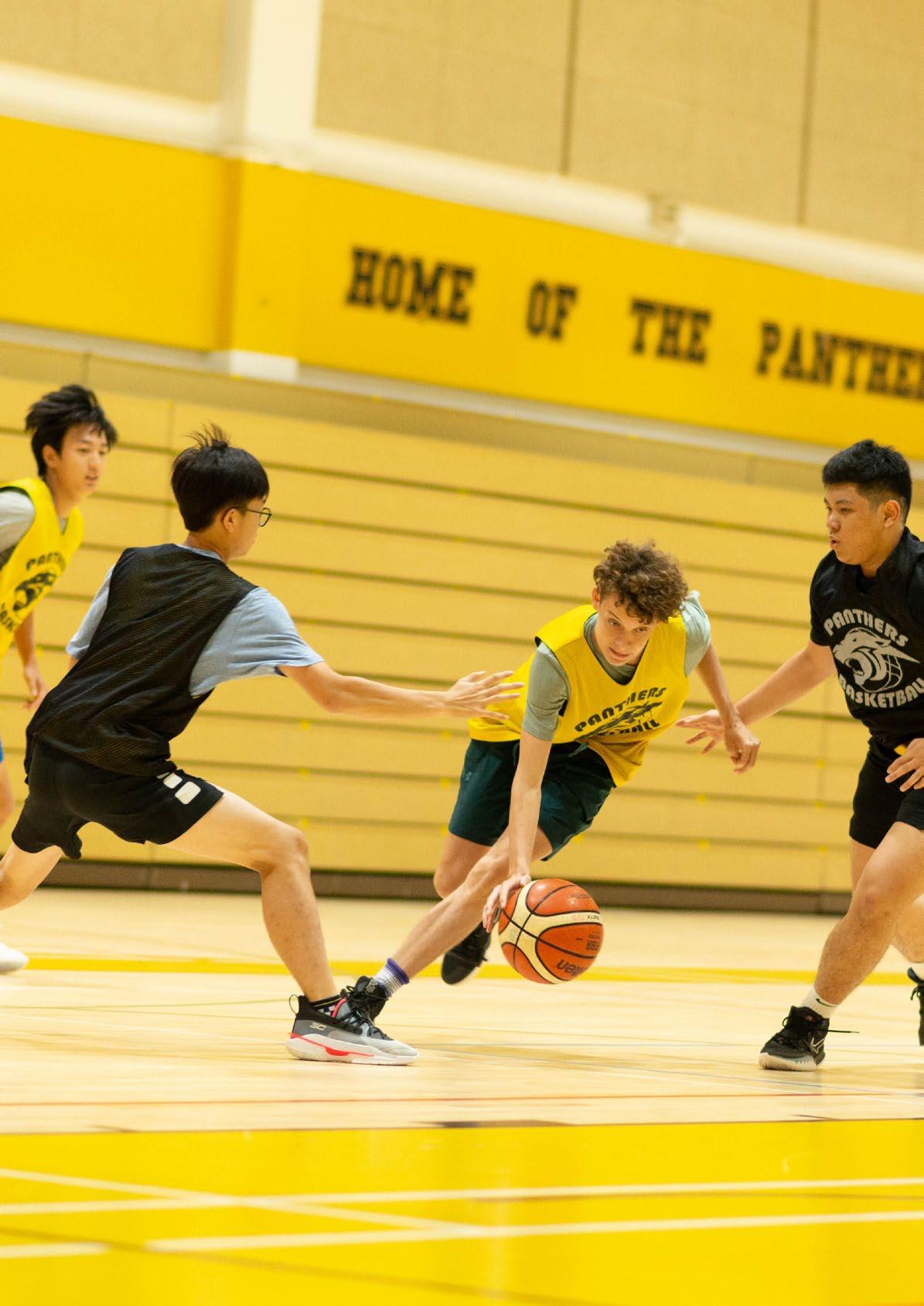
Commitment, gratitude, and courage are just three of the ISB Values displayed by our students, coaches, and community members throughout this year in Athletics. We have continued to push the limits of what has been possible throughout a challenging time and remain committed to excellence no matter the situation.
In the 2021-22 school year, students engaged in three complete athletics seasons and also had opportunities to participate in end-ofseason Bangkok Metropolitan Athletics Conference (BMAC) events. BMAC is a new athletics conference that ISB co-founded last year to increase our students’ opportunities to play.
This year, we led the way in hosting local competitions for the wider Bangkok region and Asia. ISB Athletics continued our commitment and dedication to our Interscholastic Association of Southeast Asian Schools (IASAS) family by hosting a Virtual IASAS Golf Event. It was the first IASAS Athletics event in the past two years, with fifty-two golfers from all six schools coming together across the region to participate in this tournament.
Additionally, Athletics was busy offering an ever-expanding program to our students this year. We significantly expanded our athletic offerings for Under 11 students as record numbers of elementary students joined our athletics programs, building our capacity for younger athletes. Nine different programs and opportunities were added to the offerings for this group of students, and we are excited to see them representing ISB.
As with most of our activities at ISB, this year’s difficult times highlighted our internal structures and capabilities. For example, high school students have become certified lifeguards and aquatics instructors through our own aquatics program, internal curricular courses, and after-school certification courses - gaining valuable experience coaching and mentoring elementary school students during afterschool swim programs.
Competitively, our team is also capable of running sizable internal swim meets for all ages. These meets helped prepare all our swimmers (ages 5-18) for larger multi-team external meets when those opportunities arrived. This past year external swim meets were not plentiful, but our current BMAC structure provided our swimmers with three USA college structured duel meets with the other two BMAC schools. These were small short competitions emphasizing individual improvement and not total team points. ISB also qualified and fielded its largest team for Thailand’s National Championships.
The Athletics Department is excited for the 2022-23 school year and the return of even more competitions and events.


This year, ISB was able to host all of our Wild Panther Grade 7 and 8 outdoor education trips to our Environmental Wilderness Campus (EWC) as well as various student clubs and classes. ISB is one of the few schools in the world with its own outdoor campus and a tailored experiential education program that reflects our curricular goals and objectives. Despite another challenging year, the 2021-22 school year saw further development and improvements to these programs.
Our Grade 7 program saw the development of a new orienteering course testing students’ navigation skills in a timed event and new rock climbing routes that proved both challenging and extremely rewarding for the students. Although our Water Management Authority worked on increasing the capacity of the reservoir to store water, which directly impacted our water programs for kayaking and canoeing, we successfully executed the Grade 8 water program. In this program, students were challenged to complete a search & rescue scenario in canoes and kayaks while navigating the lake.
The High School Astronomy Club also came to the EWC for their annual retreat. Using telescopes kindly donated by the ISB Parent Teacher Association, students experienced the stars and planets without light pollution. International Baccalaureate (IB) students also visited and utilized the EWC on 3-day expeditions to complete their internal assessments - from IB geography mapping to biology to environmental systems & societies (ESS) fieldwork.
This year also saw the return of Grade 5 students to the EWC for their “Crossing the Bridge” program. This program celebrates and reinforces the learning and personal development that each student has gained in elementary school and prepares students for their future learning journey in middle school.
This year we improved the EWC by replacing the solar water heaters with new units with a ceramic lining that ensures greater insulation and more environmentally sustainable use of hot water, reducing electricity consumption. Program-wise, we also opened new trails for orienteering activities and a new hiking trail in the hills immediately north of the EWC. Lastly, building on the previous year’s efforts, ISB partnered with the local Ban Phu Sai community and saw the completion of the village center community project.
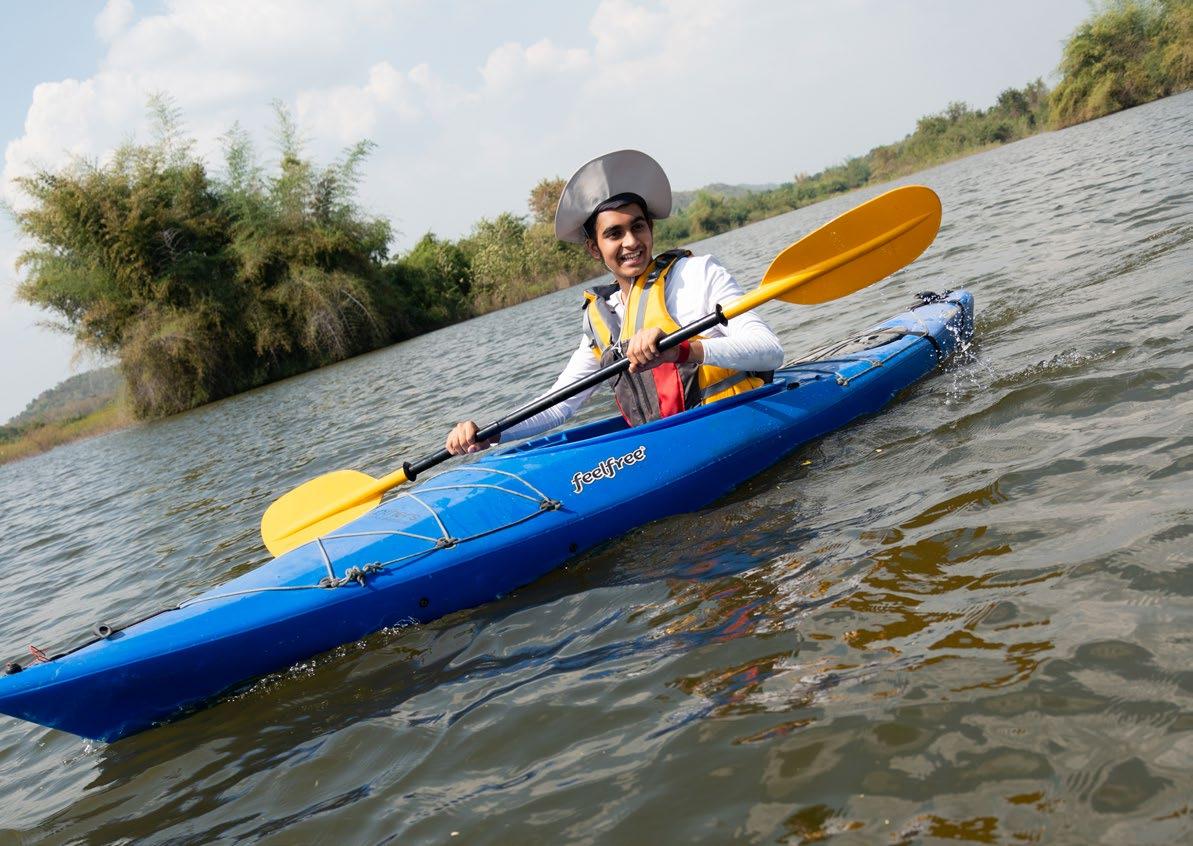

As an inclusive school, International School Bangkok (ISB) provides a comprehensive Student Services program. These services include Learning Support, English as an Additional Language (EAL), SpeechLanguage Therapy, Occupational Therapy, Counseling, Challenge and Enrichment, and Safeguarding. We deliver these services through a Multi-Tiered System of Support (MTSS).
ISB’s MTSS model has three levels of support known as tiers. Tier 1 provides universal access to all students and includes general best practices in the field of education while T ier 2 provides targeted interventions intended to supplement Tier 1 services. Tier 3 provides highly individualized support and instruction coordinated by a highly trained specialist.
We believe the best schools provide effective services to ALL students at the foundational Tier 1 level. Every student benefits from safeguarding procedures, co-teaching, scaffolds, differentiation, Universal Design for Learning (UDL) principles, social-emotional support, etc. ISB delivers these services through advisory, homeroom, content area classes, specialist classes, assemblies, and more.
Operating a system with multiple supports allows ISB to provide more targeted and unique support as a student’s individual needs increase. All students have access to Tier 1 instruction. Some students move in and out of Tier 2 services based on the response to intervention, and 25% of our students receive direct EAL, 1:1, or small group services at any given moment.

Our MTSS model was further enhanced this year through our focus on Universal Design for Learning (UDL). UDL, a research-based educational framework, teaches us that learner variability is predictable. Once we anticipate this variability, we can purposefully plan for it and provide students with multiple pathways to demonstrate their learning. UDL allows for numerous means of presentation, expression, and engagement while focusing on instructional goals, methods, materials, and assessments. The result of this is increased access to learning by reducing barriers. In other words, UDL allows flexibility in how students learn, not the standards they are learning.
ISB’s approach to providing Student Services captured the attention of the 2022 World Education Summit Conference. Our presentation, Cultural Shifts: From Inclusive to Belonging, was featured on the “Cool School” stage reserved for “amazing and unique schools and practitioners from around the world, showcasing insights, impact, and learning.” Ultimately, the university counselors support students throughout the university research, selection, and application process, helping them identify the postsecondary environment best suited to their learner profile, personality, and interests - their best “best fit.”
In addition to representing ISB at the World Education Summit, ISB continues to mentor and lead schools worldwide in developing service delivery models. ISB accomplishes this through The MARIO Framework, which was developed at ISB by Philip Bowman, and by presenting at events hosted by leading organizations in the field such as SENIA, International MTSS Summit, and CIS. This enables ISB’s Student Services Team to enrich communities throughout the world and promote equity for all students, regardless of their educational setting.
The process of applying to university is complicated, and this third year of COVID-19 disruption was no exception. Our dedicated team of four university counselors and support staff helped students and families navigate the complex challenges of applying for university admission during a global pandemic.

The Class of 2022 submitted more than 1,200 applications to over 350 universities in 22 countries across the globe, with the highest number of applications going to the United States, the United Kingdom, and Canada. University counselors start working with students during the second semester of Grade 10, guiding course selection. Formal university seminars with students begin in Grade 11 and continue into Grade 12. These seminars cover a variety of topics. Including the importance of self-reflection; research techniques; essay writing for multiple countries and university admissions styles; understanding what goes into an application; letters of recommendation; testing options and needs; the importance of authentic extra-curricular experiences; and how to connect with schools and demonstrate interest. Ultimately, the university counselors support students throughout the university research, selection, and application process, helping them identify the post-secondary environment best suited to their learner profile, personality, and interests - their best “best fit.” We were thrilled to welcome Mr. Curt Nichols to the counseling team this year. He brings with him over a decade of experience as a university and high school counselor. He’s been a brilliant addition to our office, and we’re glad to have him join our team.
Recognizing that COVID-19 profoundly impacted our students’ well-being, counselors were vital in maintaining the overall mental health of our learning community this year. The focus and location of our social-emotional counseling services may have shifted; however, our commitment to supporting the social-emotional well-being of students and families remained the same. Counselors hosted virtual lunch groups, held office hours, contacted students individually, and worked directly with families in addition to maintaining the services available prior to the pandemic.
Every student at ISB has access to a social-emotional counselor. The services provided by the counselors differ based on the developmental level of the students and their needs. This support can be provided through in-class lessons (e.g., safeguarding, conflict resolution), small group support (e.g., families in transition, friendship, self-regulation), or on a limited 1:1 basis when necessary.
Beyond providing direct support to students, our social-emotional counselors also advocate for students, support the development of inclusive policies and practices, and support the holistic needs of the school community. They do so in various ways, including presentations, parent sessions, book clubs, professional development, and committee work. Our counselors also review social-emotional data from our Strengths and Difficulties Questionnaire to help identify students who may need additional support and/or make programmatic changes.
When a student needs academic challenges beyond our differentiated classrooms, a Student Support Team (SST) is created to determine the best approach to support their learning. This practice aligns with the MTSS Framework previously discussed, allowing for more individualized services as individual needs increase. Providing additional academic challenges can take many forms based on the student’s unique learner profile.
In addition, ISB utilizes the Talent Development Framework (TDF) to provide challenge and enrichment to our students. This approach offers students four different levels of access to extend their knowledge. The enrichment activities in the first level are accessible to all students. As we progress through the levels, the services become more selective, individualized, and closely related to the student’s interests or areas of expertise.
The MTSS and TDF models follow a similar process and aim to match students’ learning needs with opportunities. Fortunately, we find that placing most of our students with same-aged peers within a heterogeneous, differentiated classroom incorporating educational best practices is the most appropriate setting.

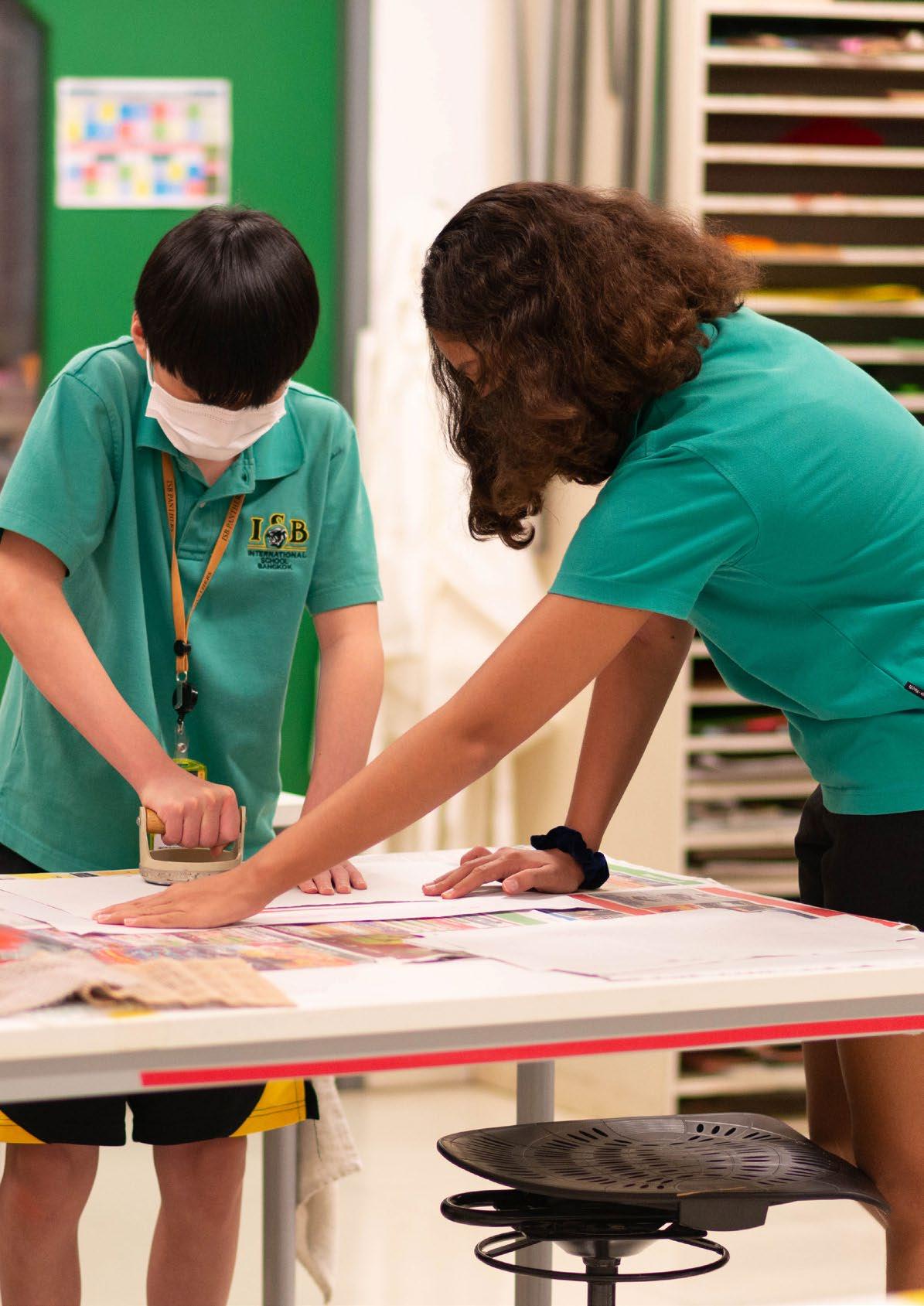
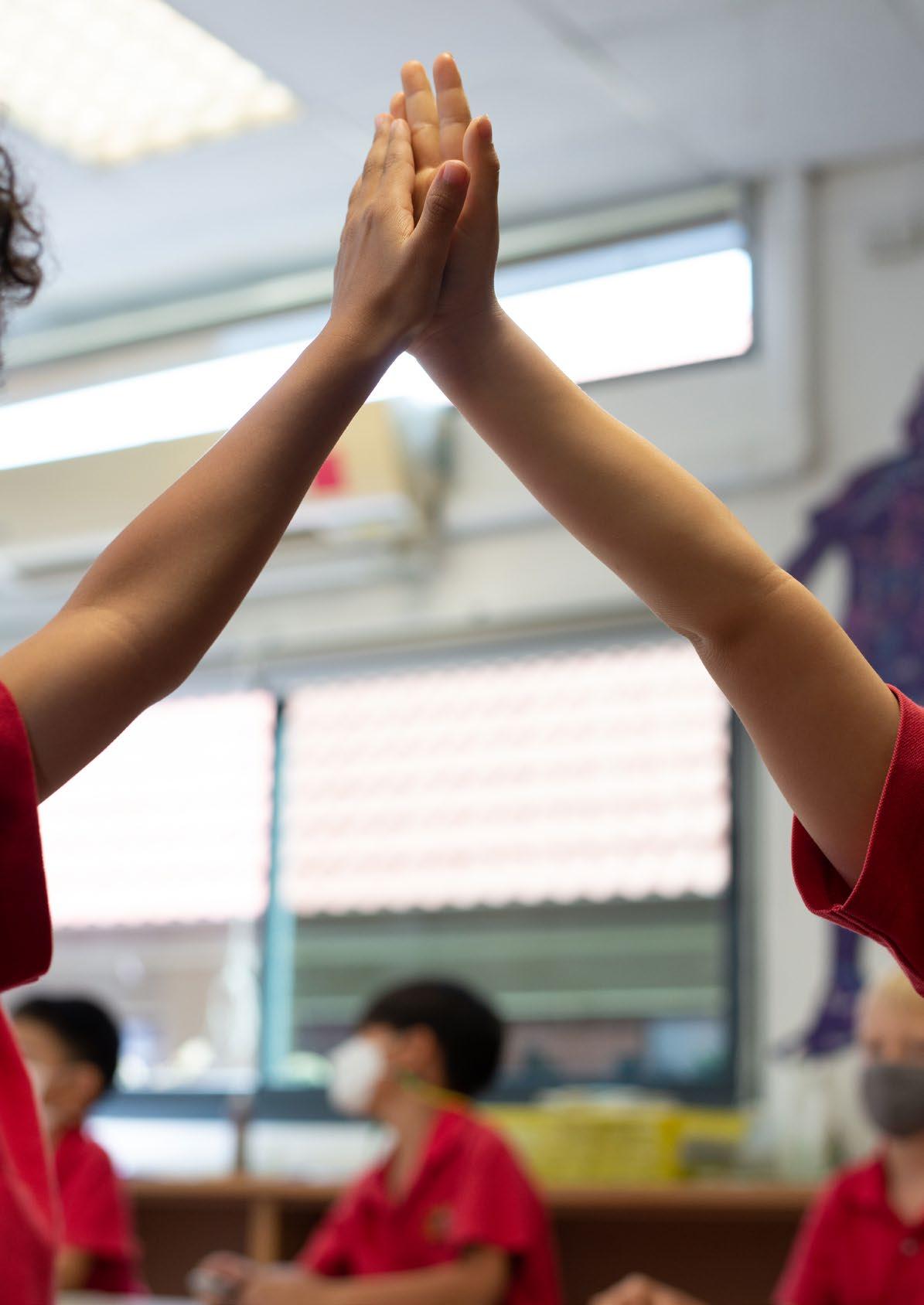
We are proud of our virtual school program and acknowledge that in-person learning is not replicable in a virtual setting. As a result, it is our duty to respond accordingly to ensure our students are ready for life beyond ISB. This year, we have reviewed data, responded to student needs, and rethought service delivery options.
Fortunately, the preliminary academic data in the older grades suggest minimum impact within grade-level cohorts. This does not imply that all students responded well to a virtual learning environment; instead, it grants us guidance on how to respond. Knowing that overall grade-level data remained consistent allowed us to focus on individual students. To address potential learning gaps, these students received additional support from our learning support teachers, learning support associates, content area teachers, and instructional assistants. Although this approach fits within our previously established MTSS framework, we did see further improvements in the system, such as increased Tier 2 interventions in the Middle School and additional 1:1 coaching in the high school.
Many parents of elementary school students around the globe would agree that virtual school for the youngest learners is a challenge. As one might predict, we identified some learning gaps in literacy and math skills. As a result, we needed a slightly different approach. Instead of focusing on individual students, we provided all students additional whole class support in key instructional areas. In time, we could better identify when a student was experiencing an instructional gap versus a learning difference. Once learning differences were identified, students entered into a more individualized Tier 2 intervention.
The impact of COVID-19 has been profound. We continue to use this experience as an opportunity to improve our services. Over the past three school years, we have become more adaptable, flexible, and responsive in our service delivery model. We will continue to review data and adjust our services accordingly in a post-pandemic world.
Finally, our Life Centered Education (LCE) program, which provides services to students with low-incidence disabilities and Autism Spectrum Disorder (ASD), achieved another milestone by extending services into Middle School. This year we had two Grade 6 students receiving highly specialized and individualized support from the LCE while integrating with same-aged peers in various content and specialist classes. During the 2021-22 school year, the elementary and middle school LCE programs shared a common space, which has benefited the programs during this first year.
Moving forward, we have identified an area and finalized plans to officially open the second LCE learning space in the Elementary School for the 2022-23 school year. Expanding and growing a program takes considerable time and attention. We are proud of our LCE team and the ISB community for embracing neurodiversity and honoring the idea that everyone is a valued, contributing member of our community.
ISB works intentionally to create a strong “Culture of Care” within our walls. Our ISB educators also design learning for students in every grade, from our youngest learners in pre-k through high school to help them become caring global citizens. The ISB Culture of Care framework was built around four pillars: being cared for, caring for self, caring for others, and caring for the world.
“Being Cared For” is a critical skill so students understand that there are others in the ISB community who they can go to for help and who are there to provide the social and emotional support our students may need. Key questions that students investigate include:
• Who cares for me at ISB? How do I know?

• Who can I trust?
• How do I access help when I need it?
Throughout the months of virtual learning, self-isolations, and increasing numbers of positive COVID cases within our community, “Caring for Self” has become an essential skill for everyone. Now that students are learning on campus and our activities are back in full swing, it is becoming easier, but it is still important for everyone to consider:
• How do I maintain a healthy balance for myself?
• How do I deal with challenges and setbacks in a positive way?
• How do I ask for help and trust that it won’t influence how people view me?
• How do I advocate for myself?
We saw multiple examples of our community “Caring for Others” during the pandemic. From walking the dog of a neighbor in quarantine to the colossal effort of students and community members to organize messages of love and raise funds for Friends of Evelyn, which helped support one of our youngest Panthers through her battle with cancer, we saw our students looking for ways to help those who needed assistance. And, though our smiles are still masked, our students are learning how to celebrate diversity and be an ally for others. We seek to understand ourselves by asking:
• How do I recognize a good friend? Am I a good friend to others?
• How do I show that I value the differences in others?
• How do I stand up for others when I see someone being treated poorly? Am I prepared to do that?
We can never stop “Caring for the World”, not even for a global pandemic. ISB continues to find ways to promote service and opportunities for our students and community to look beyond our gates and seek ways to help others. As a community, we raised funds and donations to support iCare Bangkok to provide meals to those hard-hit by lockdowns and economic hardships. Students collected blankets and stuffed toys to give to children in need of warmth and comfort.
To celebrate 70 years since ISB was established as an international school, we planted 70 trees through our Green Panthers club. Thus recognizing the importance of trees, sustainability, and empowering our younger students to take action to fight climate change and make a difference in their local communities. Our middle and high school service projects have covered a range of activities from beach and river cleanups to signing policy amendments with the government to reduce plastic use, increase recycling, and promote trash cleanups, to learning about deforestation and the importance of nature to rejuvenate and connect people with our planet and their own wellness. Students ask themselves:
• How do my actions affect the world?
• How can I make a positive difference in the world? Am I prepared to do that?
• How can I help others in a way that truly helps them?
• How can I use what I have to help others?
Student wellbeing is a foundational part of our strategic learning plan. Now, more than ever, the importance of student wellbeing is a focus for educators worldwide, given these past few years of living through a pandemic.
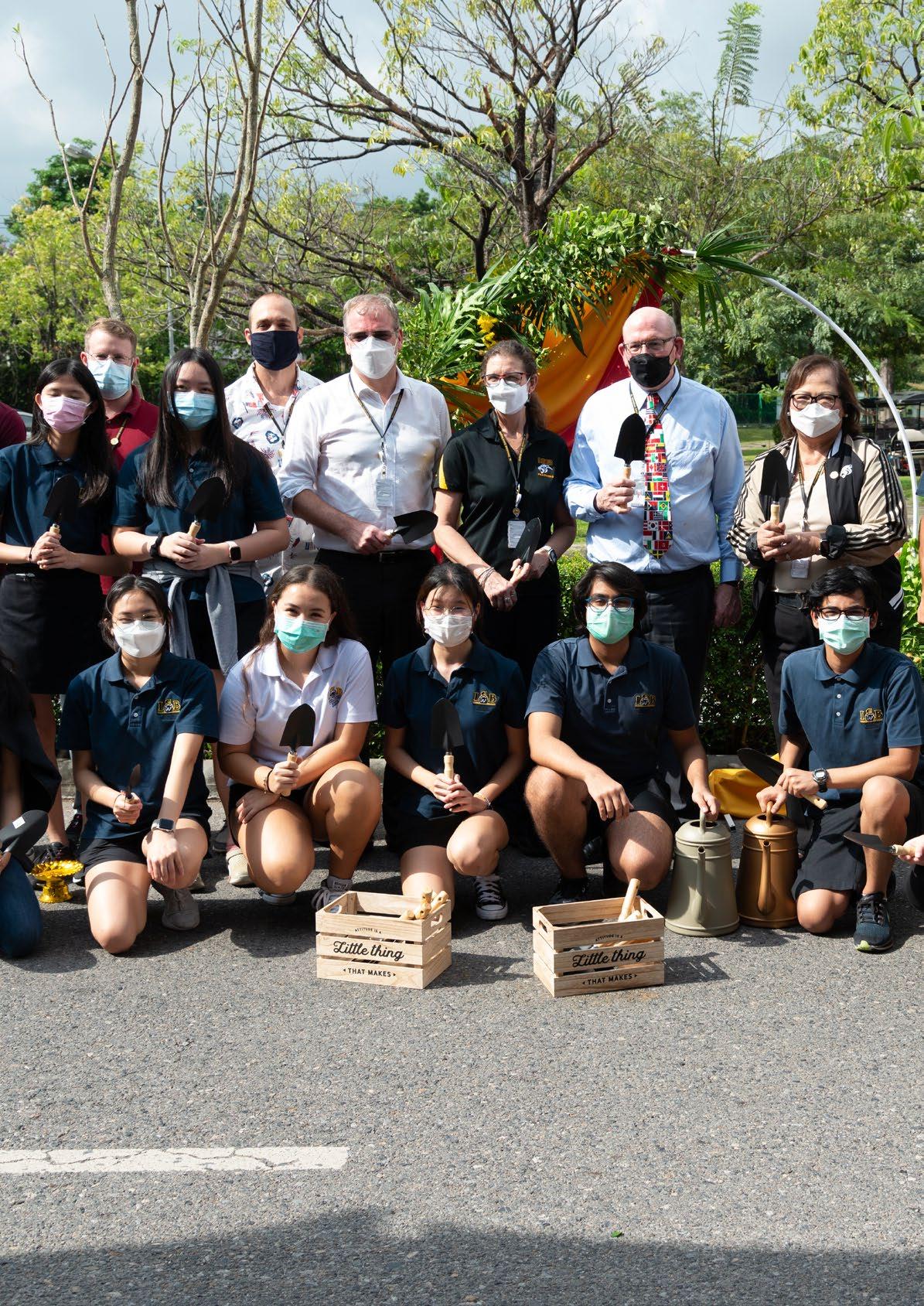
We know that multilingualism is an asset in our increasingly interconnected world. Our Pre-K through Grade 12 English as an Additional Language (EAL) team met to revise our EAL Philosophy Statement this year. The new Philosophy Statement reflects our continued commitment to ensuring that our EAL learners are supported and encouraged in their English language acquisition, exploring their identities, and the development of their full linguistic repertoires.
ISB uses a sheltered immersion model, with students receiving direct and indirect services to facilitate success in the mainstream classroom. The range and flexibility of the program allow students to receive various types of EAL services as their needs change over time. In each of the three divisions, a collaboration between EAL and classroom teachers occurs regularly to make the curriculum accessible and foster student engagement. The program’s primary goal is to support students’ English language acquisition. Students receiving EAL services are assessed regularly, using a body of evidence to monitor language acquisition and proficiency to determine what level of services are appropriate for each student.

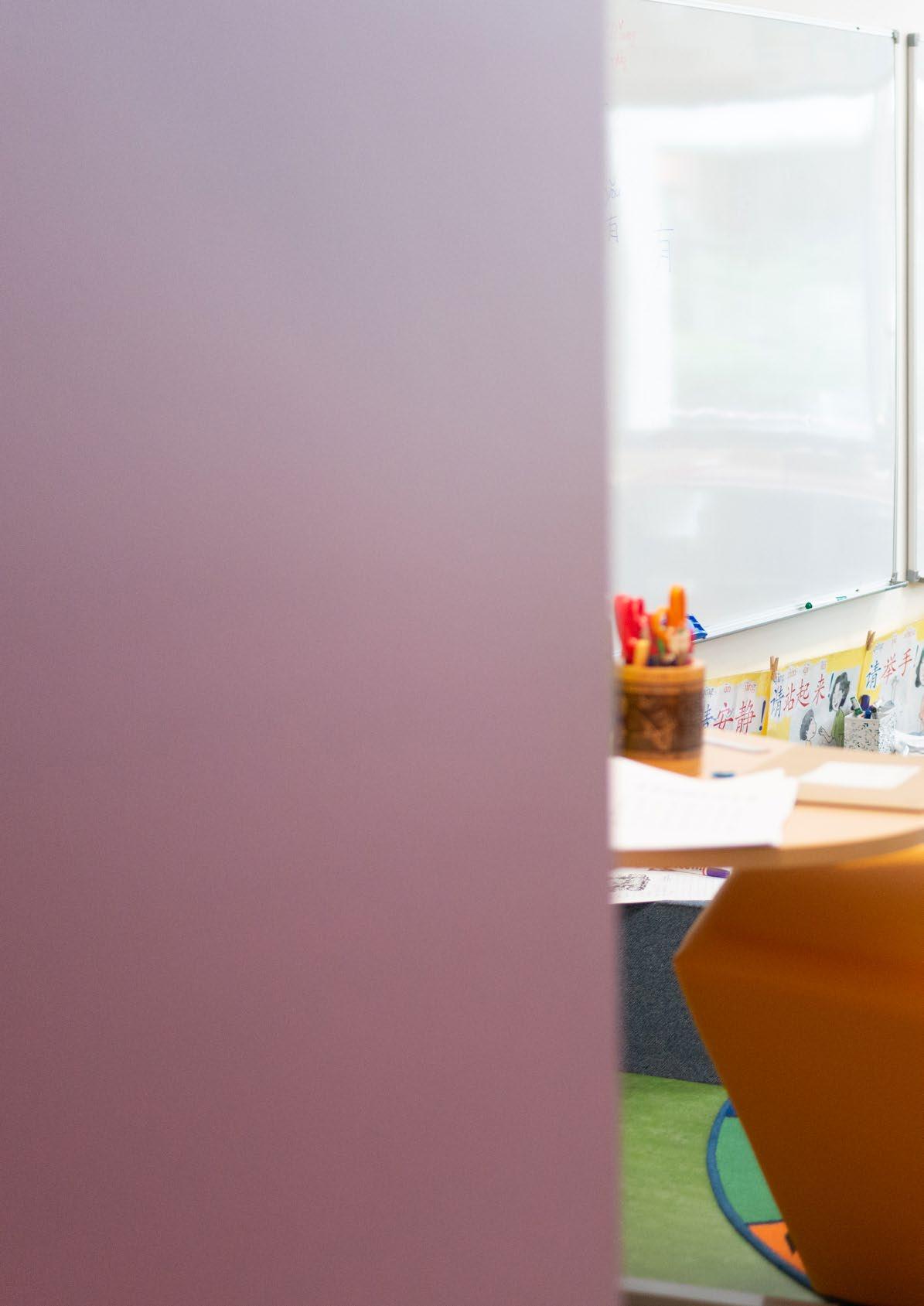
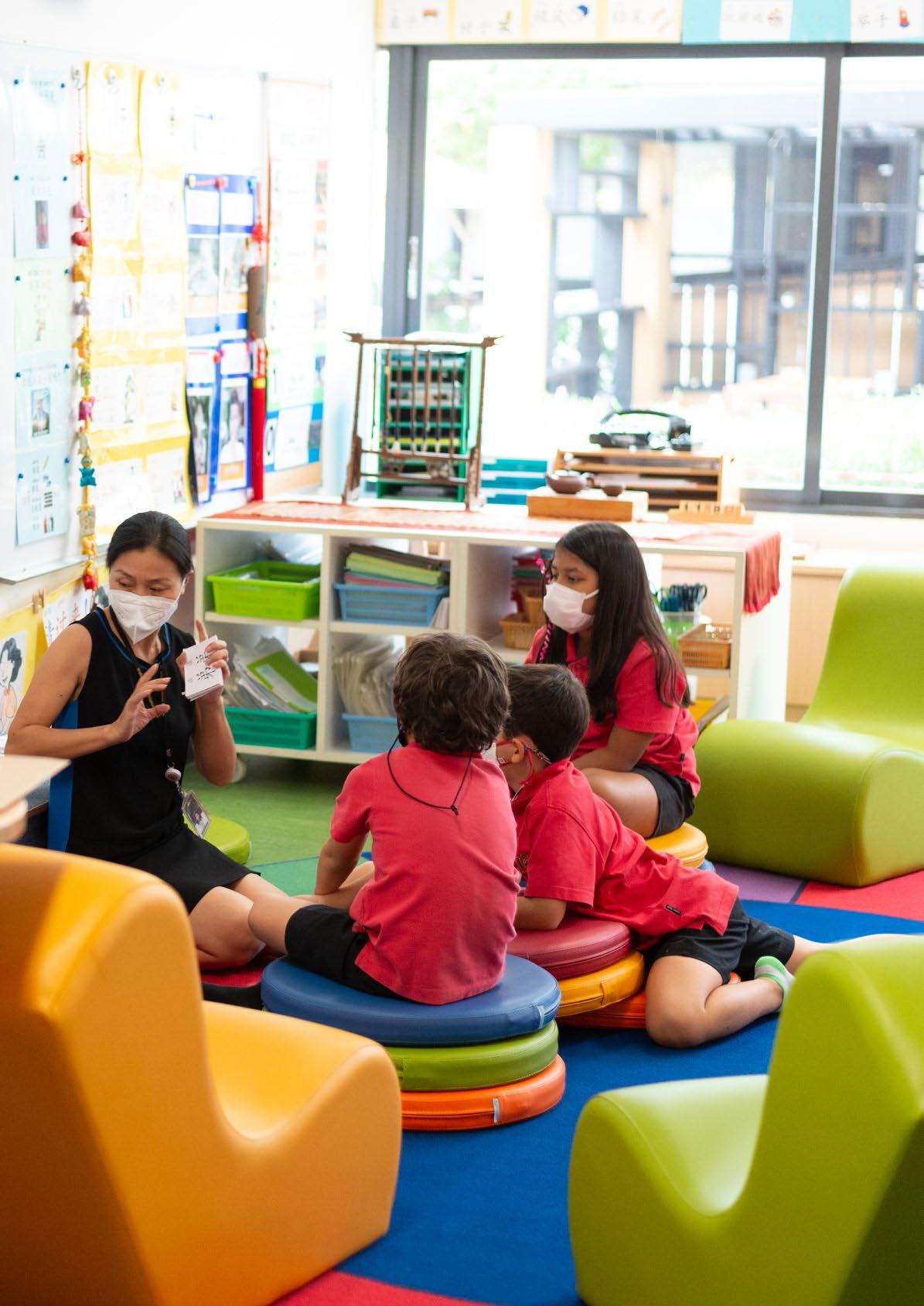
As a beautifully multicultural community, our students bring with them a vast array of languages and multilingual experiences. ISB has dedicated professional learning sessions throughout the year to develop our capacity as educators to empower our students to use all of their languages to strengthen their learning through the development of a culture of translanguaging.
What does translanguaging look like in the classroom? It looks like chemistry students taking notes in both English and Thai and like middle school students leading learning conferences in their home languages. It looks like high school students self-selecting a group with other Japanese speakers, talking about the concepts being studied in English class, then inviting a new Japanese student to join their conversation.
ISB’s Middle and High School native language classes support students in maintaining their native languages by offering rigorous classes where language learning is tied to meaningful units such as relationships (friendship), human ingenuity, sharing the planet, and human rights. Students extended their learning by presenting to different audiences on critical topics such as wellness, environmental issues, and the UN Sustainable Development Goals. Our students also submitted articles that were published in their home countries. The connection between our students’ language learning and their learning across all content areas is evident.
Our elementary school students develop solid foundations in additional languages (Mandarin, Spanish, Thai) through units like healthy lifestyles, family, and Thai culture. The Elementary School language department has been aligning content and evaluating the program to prioritize content while creating a clear learning pathway. A significant effort this year was the pilot program to include students receiving English for Academic Purposes (EAP) and Tier 3 learning support in language classes. This pilot has received positive results, and the team will be looking at ways to extend this throughout the Elementary School.
In 2021-22, the Panther Native Language Academy (PNLA) continued to offer after-school classes for students who were either unable to take a native language class during school or who needed extra support as determined by the teacher of the native language class in school. Classes were offered in eight languages to 78 students in semester one and nine languages to 100 students in semester two. Classes went from virtual to hybrid to in-person over the course of the year. The PNLA remained parent-paid, with ISB sponsoring a second class per week when there was sufficient demand/availability. Celebrations such as the International Day of Multilingualism (March 27) and the Dutch Koningsdag (April 27) marked our return to in-person PNLA in the second semester.
Other highlights from this year’s language classes included French and Spanish students doing a TEDx talk on wellbeing in their target language with parents as the audience in our Chevron Theater. While Japanese language students learned the structural and linguistic features of an expository letter, they then wrote and sent a “Letter to the Editor” of a Japanese newspaper, Asahi Shimbun, one of the premier newspapers in Japan. The paper published one of our students’ articles in November 2021. The article’s theme is “taking good care of things in the way you treat the thing as your friend” to improve and raise environmental awareness. And middle school students discussed, in Korean, the 20th presidential election held in Korea this year, developing their ability to make logical arguments in a fun way.
The ultimate goal of language learning is to support students in becoming effective communicators in either their native language or an additional language. The learning is carefully designed by teachers who look at standards, including the ISB English Language Arts Standards, ONESQA, and ACTFL. Our teachers create learning activities that give our students opportunities to transfer and apply real-world skills and tie them to deepening their understanding of important issues and cultures.



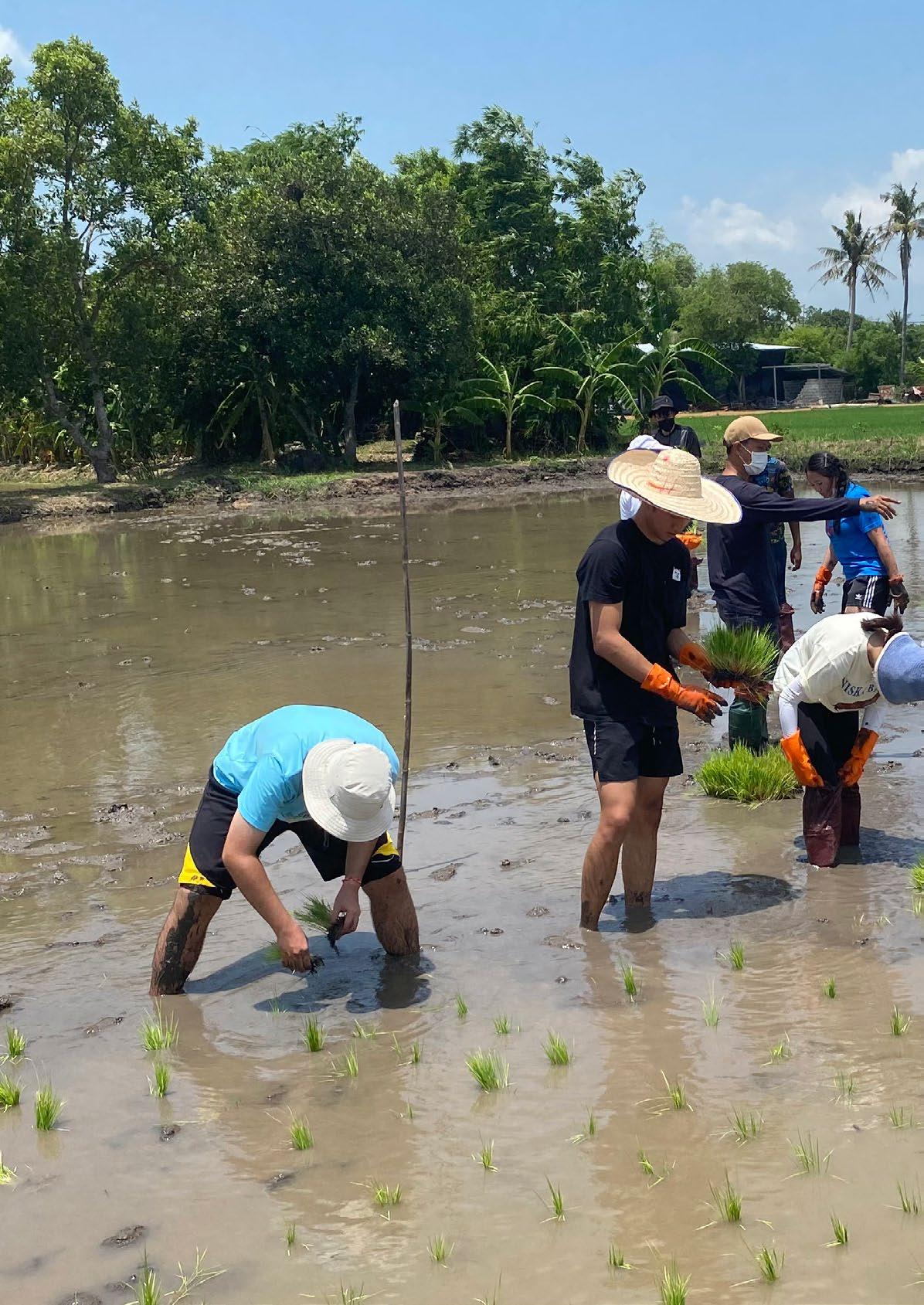
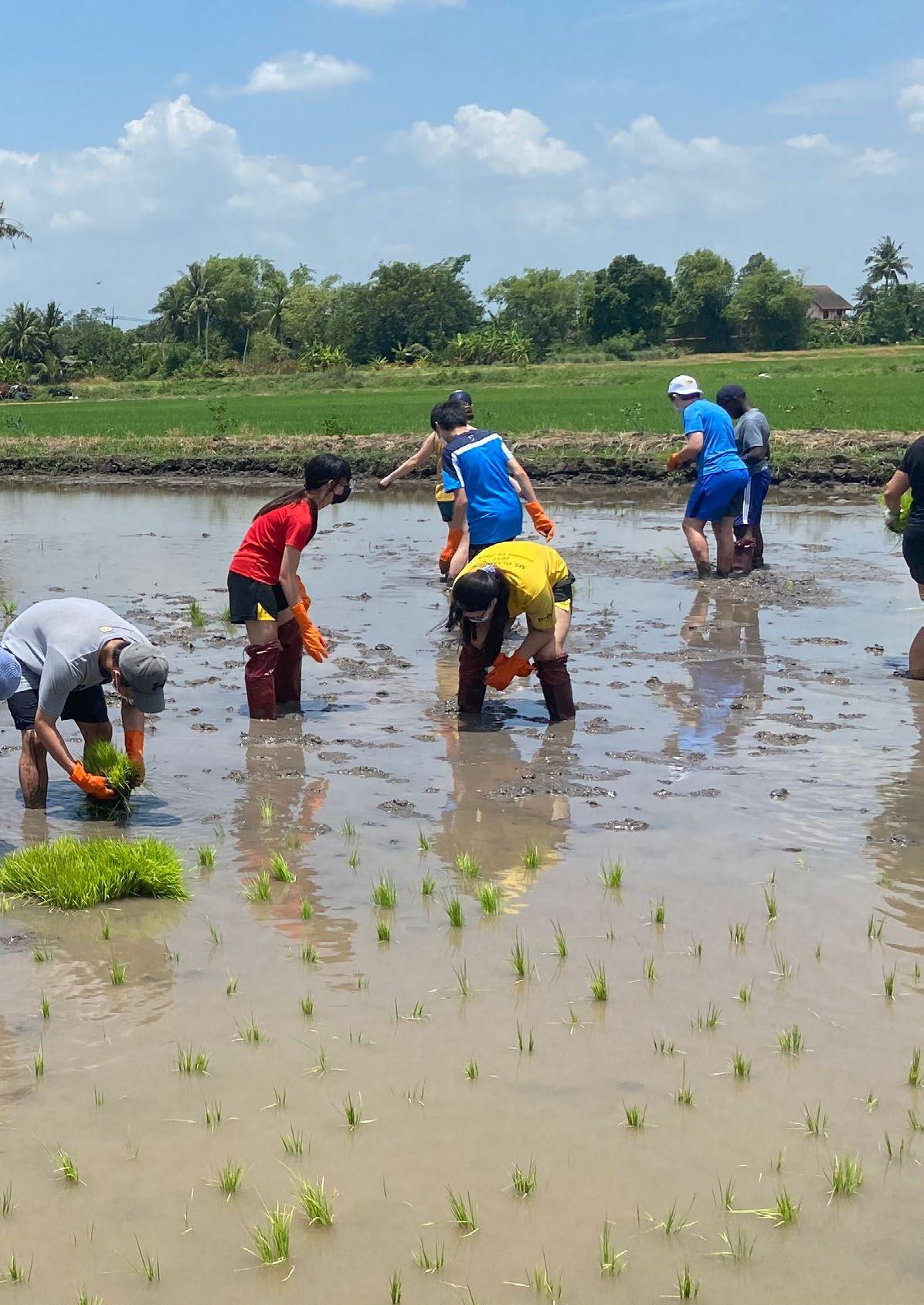

Globally-Minded is one of our six ISB Learner Attributes. We use these to guide our thinking, actions, and reflection within our curriculum, pedagogical practices, assessment, and program design.
Our teams review our resources and units of study to design intentional learning experiences that align with our Learner Attributes and our vision of enriching communities through our learners’ intellectual, humanitarian and creative thoughts and actions.
We define our globally-minded learner attribute at ISB through the lenses of cultural diversity, personal and social responsibility, perspective-taking, and applying knowledge to current global issues.
During the first semester this year, we leveraged our time virtually and engaged high school faculty members and students with developing leadership dispositions and skills through a series of workshops. From there, a team came together to gather student feedback and suggestions to co-create an ISB Student Leadership Retreat for high school club officers in the second semester. By developing our student leaders, we can support a positive impact on our local and global community. In the future, we plan on expanding and hosting our ISB Student Leadership Retreats to be facilitated by students for students twice a year.
Our inquiry continued this year into our curriculum, practices, and program. We learned more about how to support our students in their self-reflections and discoveries. We are committed to this ongoing reflection and action as a learning community so that perspectivetaking, appreciation for cultural diversity, and a sense of personal and social responsibility are nourished within our learning experiences for all students.
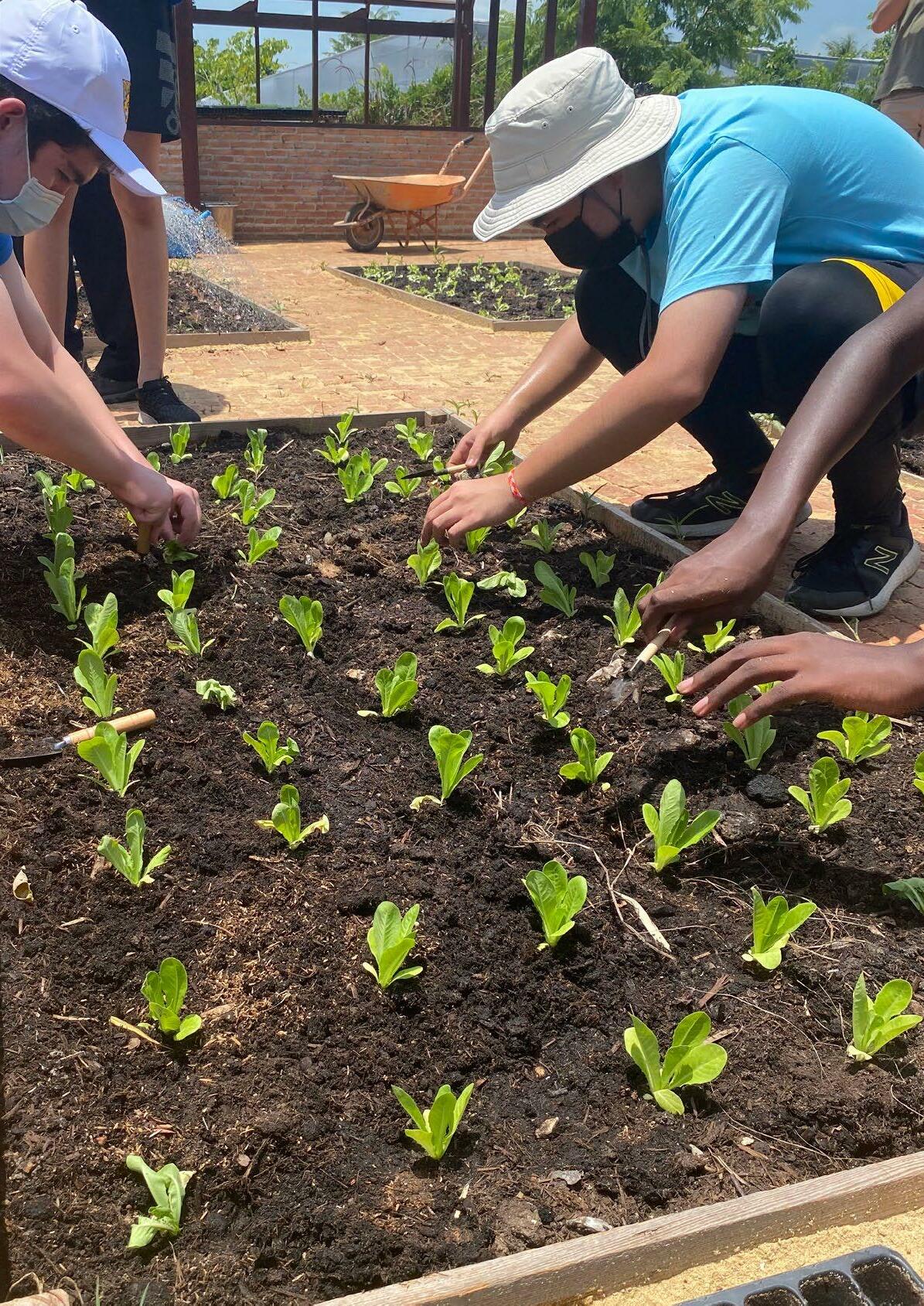
Bangkok Adventure
Bumblebee Library
Cycling/Biking in Thailand
English Service Project (ESP)


Food & Social Impact Bangkok Old Town
Habitat for Humanity Thailand - Local


iCare
Nonthaburi School for the Deaf (NSFTD)
Painters/Builders with a Conscience
Panther Planters
Project Deep Blue
Reclaiming the Coastline (EWC Kayak)
Sam Roi Yot
SUP Expedition Kanchanaburi
Teacher Internship
Visual Arts & Service Ayutthaya - Chao Phraya River
Wilderness Adventure - Nam Pha Pa Yai
Wildlife Conservation & Service Petchaburi
Discover. Explore. Learn. Volunteer. Enrich. The DELVE program’s mission is to create meaningful and transferable experiences that engage students in collaborative, authentic learning opportunities to deepen their understanding of local communities, cultures, and the environment by developing appropriate skills and attitudes through humanitarian action. This year our high school DELVE trips and experiences took place at the end of May. What a celebration it was to be able to bring these experiences back to life after the past few years.
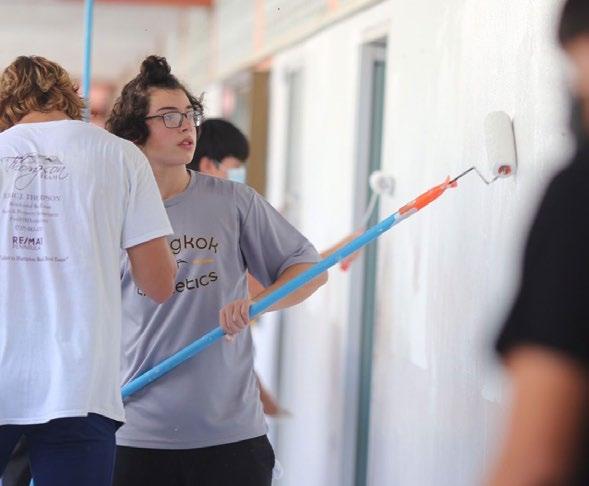
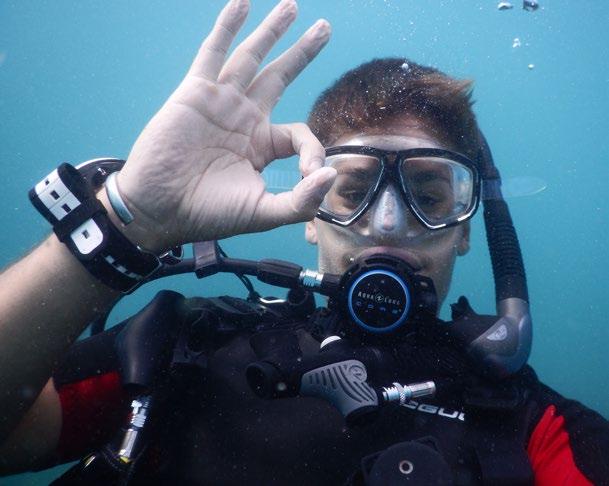
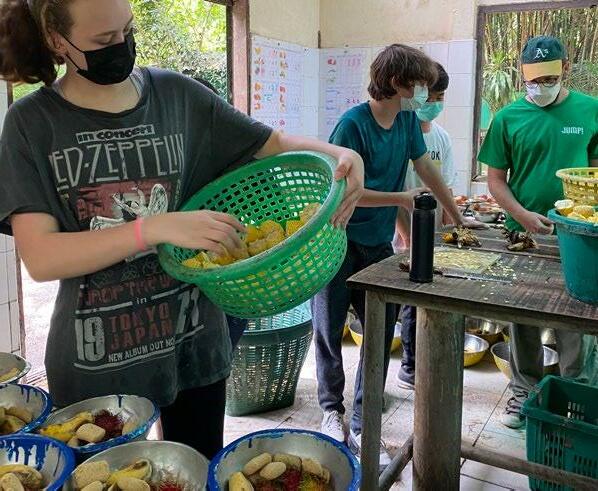
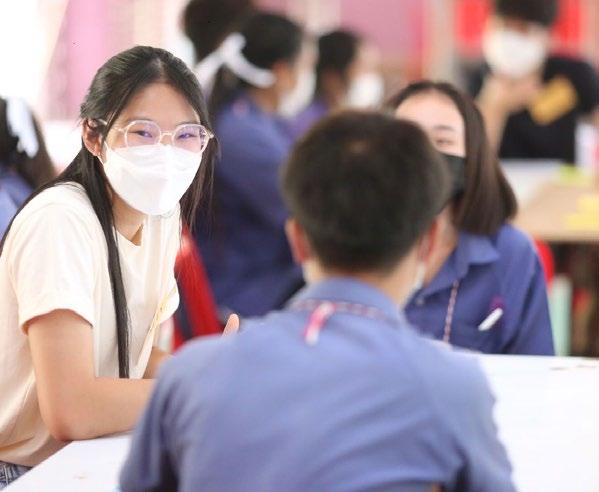
Service learning is defined by its unique approach to addressing genuine community needs and giving back to those communities nationally and internationally. Globally-minded and value-driven students are engaged with community outreach and service learning. These projects help students develop transcendent values of care, respect, responsibility, and courage.
ISB’s Service Learning program seeks to develop learners who are:

• Reflective thinkers who understand their strengths and limitations, who can identify goals, devise personal growth strategies and are willing to accept challenges
• Aware of themselves as members of communities with responsibilities towards each other and the environment
• Active participants in sustained, collaborative projects
• Balanced, who enjoy and find significance in various activities involving intellectual, physical, creative, and emotional experiences
International School Bangkok students are constantly engaged in community outreach & service learning activities. This past school year, ISB students spent a total of 7,400 hours in clubs, with 3,800 of those hours being spent on service-related activities and clubs. Of the 54 active student clubs in the 2021-22 school year, 30 were service clubs. Although some of our usual service activities were canceled due to COVID-19 regulations this year, several old and new activities took place.
ISB Middle School students demonstrated great care, courage, and commitment through various service clubs, events, and trips this past year. Here are some of the highlights from the 2021-22 school year.
The COVID Relief Club focused on helping those most impacted by COVID - mainly by working with iCare to get food and financial donations, raising over THB 100,000. ISB hosted a Service Conference, where 10 Middle School students volunteered to run ice breakers and a simulation on sustainability called “Tragedy of the Commons.” We also hosted Shark Guardians at ISB for an assembly to educate our students about shark conservation.
With the TerraCycle Thai Foundation, MS students went on a trip where they cleaned out the klongs in Bangkok. In total, they removed 1,065 kg of trash. Students also worked with Ocean Cleanup at an event to witness the Memorandum of Understanding (MOU) signing with the Ministry of Natural Resources and Environment. This MOU will bring interceptors (river clean-up devices) to the Chao Phraya river.
Finally, an entirely new concept this year was having Grade 7 be the centerpiece of environmental education in the MS. Students went on various environmental service trips. The goal is to grow these trips into larger service projects now. The trips included:
• TerraCycle: students cleaned waste out of the Ladprao klong and learned how recycling doesn’t work the way people think it does
• iCare: students visited disadvantaged communities to provide food for people in desperate situations
• SOS: students gathered food leftover from hotels and restaurants to feed those in need
• OC Organic Shop: students learned how to reuse and refill many everyday household items from a zero-waste shop in the Nichada community
• OurLand: students learned about elephants, sustainable living, planting trees, and buying land
• Bring The Elephant Home: students studied the human-elephant conflict
• LoveWildlife: students discovered the impact of trash on marine life
• Happy Grocers: students learned about sustainable, regenerative farming and understanding the impact of food choices
The Discover Explore Learn Volunteer Enrich (DELVE) program is designed to give students service experiences that inspire them to become caring global citizens. DELVE aims to create an opportunity for students to have a meaningful and transferable learning experience where we construct understanding by developing and applying knowledge, skills, and attitudes.
This year’s DELVE trips were based in Thailand and ranged anywhere from day trips to weeklong trips. Students engaged in sustainable service and gained awareness of issues that transcend borders. They learned to understand the problems of poverty, indigenous peoples, and environmental degradation and preservation while simultaneously helping people. Students planned and worked together as teams, strengthening their teamwork for the common goal of a greater good.
Some of our most successful 2021-22 DELVE trips were:
• Habitat for Humanity: students spent the week on two house-building sites
• Wildlife Conservation and Service: students worked with local wildlife conservation organizations caring for the animals and comparing components of government-sponsored breeding programs to other conservation centers
• Food & Social Impact: students learned about food security and food poverty in Bangkok and Thailand from community partners and nonprofits working to solve the issue
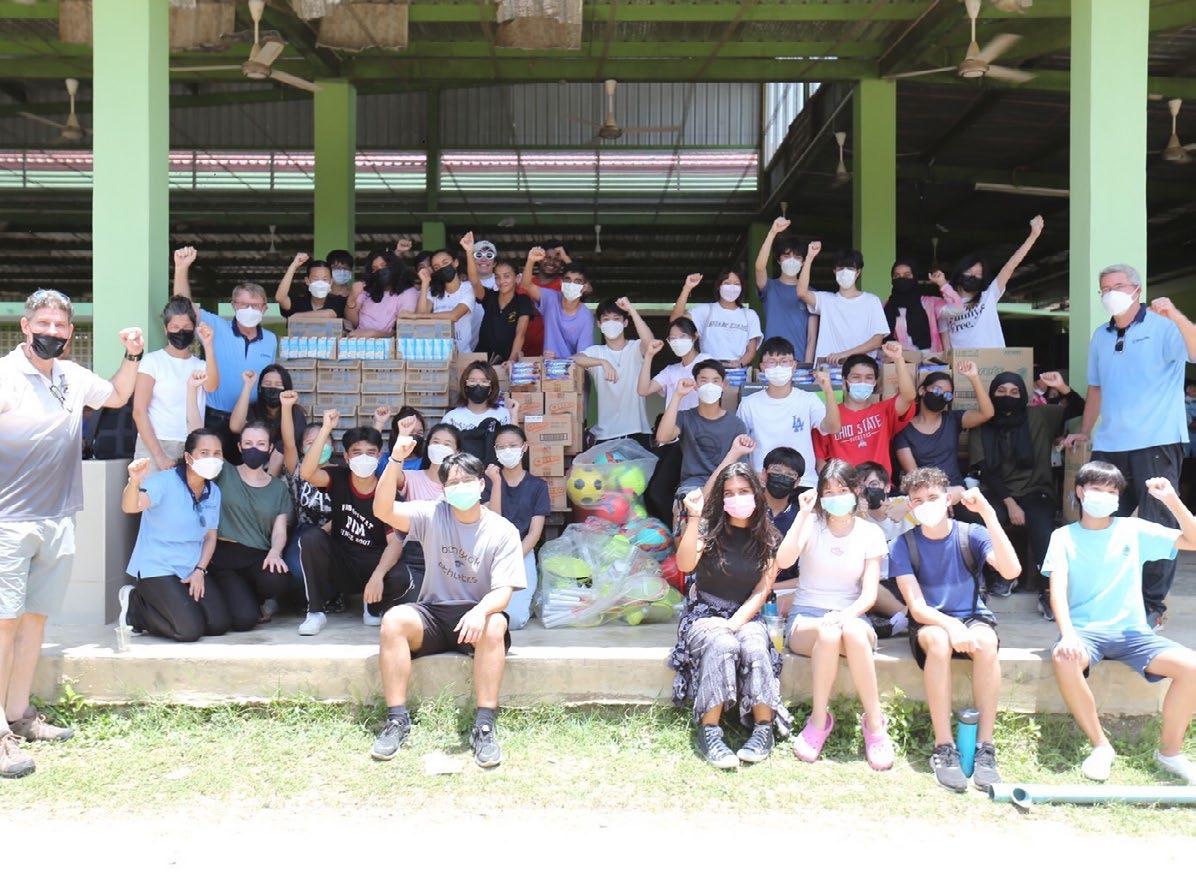



ISB raised THB 423,209.87
for the 2021-22 school year
The past year has been a challenge on all fronts here at International School Bangkok, but in many cases, we chose to overcome the adversity and truly make “lemons into lemonade.” This was definitely the case with our new partnership with iCare Thailand.

Over the past school year, ISB has raised funds and donated basic-needs items such as food, daily hygiene supplies, and clothes. We have also done our best to gather some much-needed comforts in life like books, holiday gifts, and funds to buy bikes for transportation to school.
All three divisions of ISB students came up with different fundraising initiatives and activities, including the following:
• Cuddle Donations (blankets & stuffed animals)
• Peace Day “We Care” Fundraising
• Climb a Stair for iCare
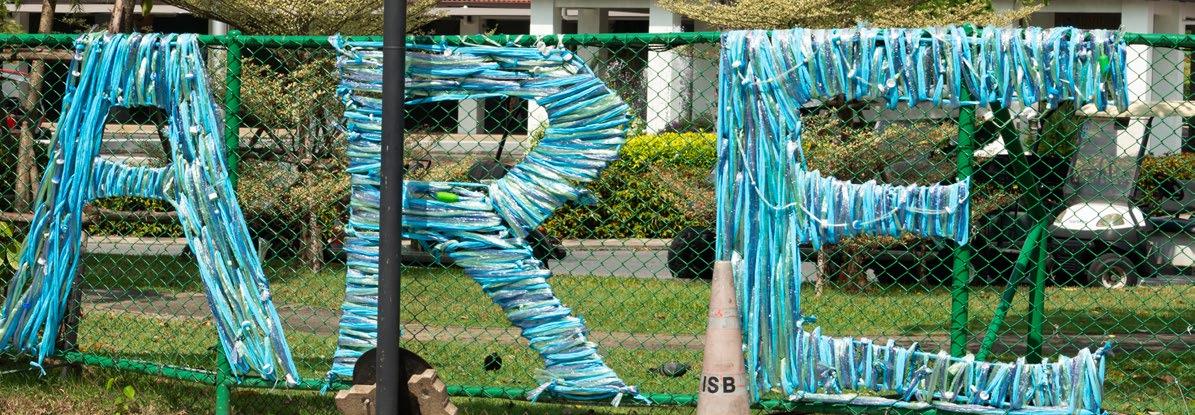
• High School Gift Donation
• Food Drives
• High School Talent Show Fundraiser
• High School Gaming Championships
Fundraiser
• Partnership with Nichada Thani Fundraiser

ISB donated more than 20 truck loads of foodstuffs throughout the year to the iCare warehouse storage unit including thousands of pounds of rice, canned milk, fish, and other dry goods. Along with these donations, ISB raised THB 423,209.87 for the 2021-22 school year, with an average of 32,000 donated monthly from ISB staff payroll.
The ISB Peace Day fundraising campaign and other initiatives raised close to THB 1,000,000 this year. Peace Day presented the opportunity for students to challenge the way we think and act, and choose to do things differently - to care for those around us and the planet we share, to Reimagine the World better!
ISB offers an amazing diversity of clubs and activities available to elementary, middle and high school students. Everything from Rock Climbing to Software Development to Tactical Systems Roleplaying is available for students to explore. Participation in clubs gives students a chance to try something new, or further explore an interest in a low-risk, inclusive environment.
School clubs are student-initiated and student-led, and teachers are only involved in supportive roles. Clubs therefore represent an excellent opportunity for students to lead, as the success and growth of their club is a direct reflection of the club officers leading the group. New clubs are created by students each year, and some clubs have continued for over 20 years.
of service club meetings
September
March 6 months
Over 7,400 Hours
Over 3,800 Hours from all club meetings
September
March 6 months
30 of which were service clubs this year
was cancelled this year due to COVID
Celebration of Service, a service event, happened. We packed and donated gift boxes for 70 kids living in the Street Boys Home. A clothes and food drive was also held at the event. A truck full of clothes, gifts, and food was donated.
was canceled this year
Protection Against Violence and Ending Discrimination (PAVED)
- organized advisory sessions with grade level leaders and teacher reps. for the entire high school student body. The goal of these lessons was to educate our community about gender based violence
we had a gift box drive and donation drive where we sent over three full trucks to the families living in the slums
organised a Women in Leadership Seminar where students from international schools in Bangkok got an opportunity to meet female leaders. Leaders included Kattiya Indaravijaya (CEO of KBank), (June) Juthasree Kuvinichkul (Founder of Grab), (May) Yuwanun Sripraprutchai (Mechanical Engineer), Shannon Kalayanamitr (CEO of 5G Catalyst Technologies)
was canceled this year
ServICE (Inspire, Connect, Empower) Conference was hosted at ISB in January. The main focus of the conference is to develop practical ideas that will better our society. The conference had over 150 student participants and brought together service clubs from international schools in Thailand
Robotics for Kids held events throughout the year and raised over 70,000 Baht for Prasert Islam school, Schools Of Hope Foundation, and Phimai Vithaya School

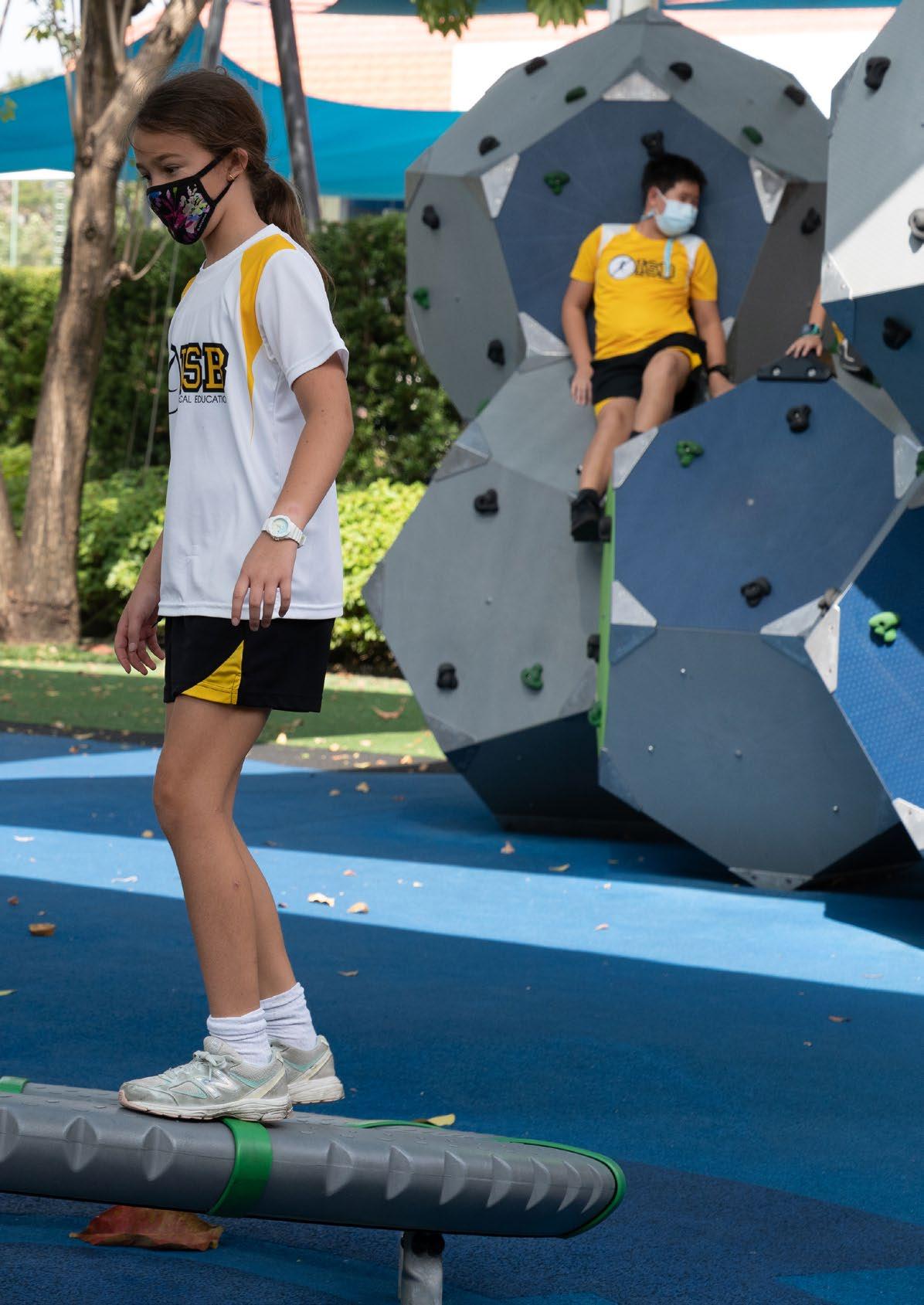
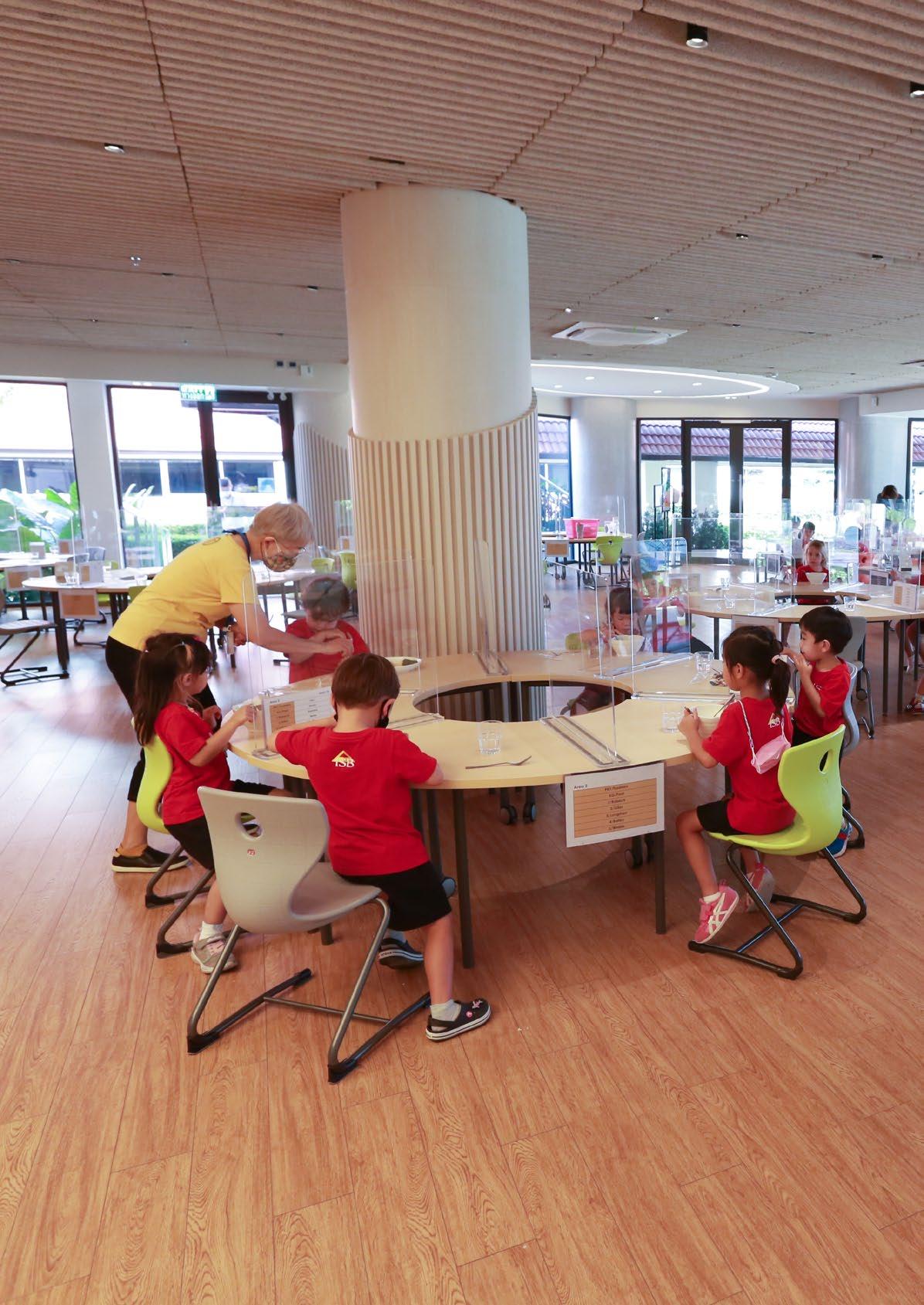
During the campus closure, we were able to take advantage and invest heavily in facility upgrades and retrofits. Most notable was the renovation of the Elementary School (ES) Cafeteria, which was purposebuilt for elementary students with appropriately sized furniture and serving counters.

The ES Cafeteria’s service station is uniquely designed, so the floor where cafeteria staff stands is lower on the staff side than the student side, thus putting staff and students at equal eye level. Similar to the middle and high school cafeteria, elementary students are now asked to be responsible for bringing their plates to the return station after their meals. The food preparation space has a sizable seamless glass window through which students can observe the bustling activity in the kitchen and discover how their food is made. The design also incorporates floorto-ceiling windows that provide wonderful views of the playgrounds, athletics fields, and turtle pond. A coffee corner was constructed on the ES cafeteria terrace so students and parents can now enjoy drinks and bakery items near the playgrounds and athletics facilities.
Our students were most excited by the completion of the new Sky Park and Parkour Park playgrounds. After opening the Panther Park early childhood playground in the previous year, we were able to complete the second phase of our playground vision by converting the basketball hardtop and the “Big Toy” into new age-appropriate play areas inspired by ES students’ designs created during the “Playground Design Challenge,’’ where students worked alongside our designer to imagine new play spaces. The trampoline, zip lines, and the “highest slide ever” were all part of the original student designs, as was the possibility to traverse from the ES along the fields to the playground without ever touching the “hot lava” below…The playgrounds are designed to challenge our learners physically and mentally while providing fun, stimulating creativity, and allowing them to take developmentally appropriate risks.
As part of making learning more transparent, we replaced classroom doors schoolwide. These new glass doors connect the inside and outside environments providing interconnectivity between learning spaces and the surrounding environment. They are also fully integrated with our access control system, providing increased security. Other capital projects included increasing the school’s electric capacity to have a second alternative source that helps us during brown-outs; ongoing painting of the campus; installation of a new Public Address system; installation of a new roof on the gyms to prepare for installing solar panels in the summer of 2022; plus significant investments in landscaping to continue to have the school look beautiful and natural. We also planted (fruit) trees, plants, and flowers which have brought fauna back on campus, including three beautiful owls that have made their home in the Early Childhood garden.
Assessment is an integral part of a student’s educational experience. It is the process through which we gather, record, and analyze data to improve student learning. ISB utilizes multiple measures to help us monitor student progress and make decisions about the best next steps to ensure that our students are moving forward on their learning journey.
Teachers use formative assessments during the learning to design meaningful learning opportunities. Summative assessments are used at the end of a unit to measure the learning outcomes. Other assessments used by ISB include outside tools such as MAP (Measures of Academic Progress), ISA (International Schools Assessment), IB (International Baccalaureate) & AP (Advanced Placement) exams. These provide comparative information that we can use to evaluate programs and plan for improvements. Assessment is a multi-layered process, but the ultimate purpose of assessment is to improve learning.


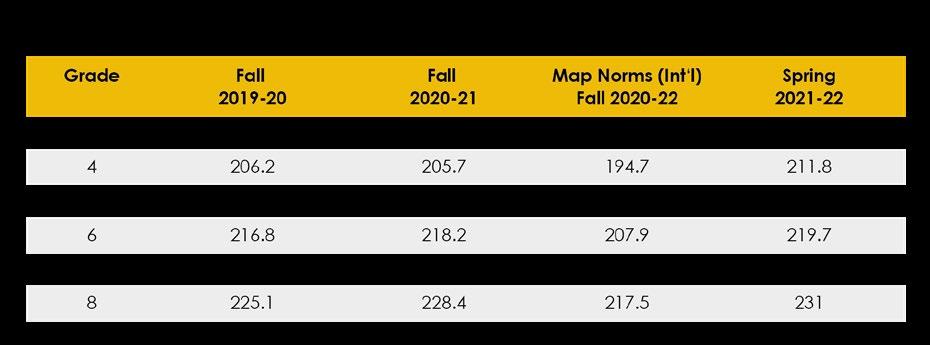
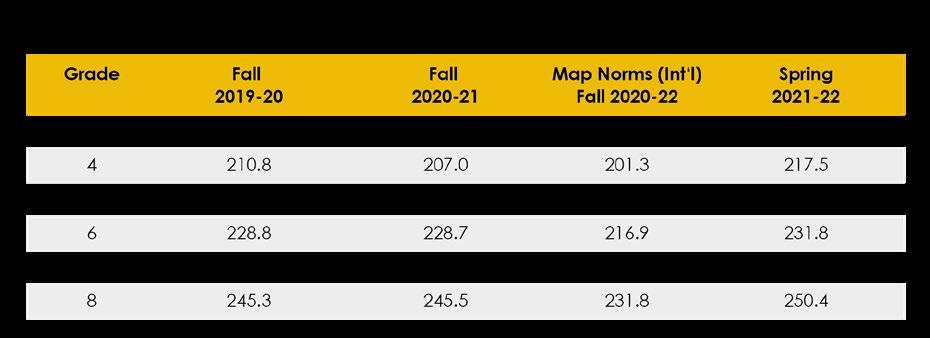

Average over the last 5 years
International Baccalaureate (IB) students at ISB consistently score above the world average, with this year’s average diploma score of 36.1 being a full 4 points higher than the global average. Our High School IB students exemplified excellence in action with a 98% pass rate, 41% of IB candidates achieving a bilingual diploma, and 22% of candidates scoring 40 points or above. One student earned an outstanding perfect score of 45 points. Justin Alexander, High School Principal said, “congratulations are well and truly due to the class of 2022. The HS faculty and ISB community are so proud of your achievements and successes during an extremely challenging time to be a high school student. You dealt with virtual school, time out of school because of illness, and other disruptions with a sense of positivity and hope that served you well in your final IB exams. Congratulations to the class of 2022 and all the best for your bright future!”
144 IB Candidates
114 Awarded
36.1 points
Attained by 22 % of ISB diploma students
32 points Average world score
76% of ISB Courses above world average
5.6 points
5.72 points
26 Students Scored
85%
98 students scoring 5, 6, or 7
3 Students Scored
1 Student Scored
64%
EE grades at A or B students awarded a bilingual diploma
41% ISB students who are IB diploma candidates
73%

Below is a list of acceptances for the classes 2020-2022. Those in Bold Italics represent a 2022 matriculation.
Curtin University
Deakin University
Griffith University
James Cook University
Macquarie University
Monash College
Monash University
Queensland University of Technology
Swinburne University of Technology
University of Melbourne
University of New South Wales
University of Newcastle
University of Sydney
University of Tasmania
University of Technology Sydney
University of Wollongong
BELGIUM
Catholic University of Leuven
CANADA
Algoma University
Bishop’s University
Brandon University
Brock University
Capilano University
Carleton University
Concordia University
Dalhousie University
Emily Carr University of Art + Design
Fraser International College
McGill University
McMaster University
Ontario College of Art & Design
Queen’s University
Seneca College of Applied Arts and Technology
Simon Fraser University
Thompson Rivers University
Toronto Metopolitan University
Trent University
Trinity Western University
University of Alberta
University of British Columbia (4)
University of British ColumbiaOkanagan
University of Calgary
University of Guelph
University of Ottawa
University of Toronto (5)
University of Victoria
University of Waterloo
University of Western Ontario
University of Windsor
Vancouver Island University
Western University
York University
CHINA
New York University Shanghai
Tsinghua University
University of Michigan & Shanghai
Jiao Tong University Joint Institute
FRANCE
ESCP Business School
Paris College of Art
GERMANY
Jacobs University
University of Applied Sciences
Würzburg-Scheweinfurt
HONG KONG
Chinese University of Hong Kong
City University of Hong Kong
Hong Kong Polytechnic University
Hong Kong University of Science and Technology (2)
Lingnan University
The Chinese University of Hong Kong
The Education University of Hong Kong
The University of Hong Kong
HUNGARY
International Business School
IRELAND
Trinity College Dublin University College Cork
JAPAN
Hokkaido University
International Christian University
Keio University
Keio University, Shonan Fujisawa
Kwansei Gakuin University
Kyushu University
Nagoya University
Ritsumeikan Asian Pacific University
Ritsumeikan University
Sophia University
University of the Sacred Heart
University of Tsukuba
Waseda University (3)
THE NETHERLANDS
Amsterdam University College
Erasmus Universiteit Rotterdam
Leiden University
Maastricht University
Radboud University
Tilburg University
University College Maastricht
University College Utrecht
University of Amsterdam
University of Applied Sciences
University of Groningen
Utrecht University
Vrije Universiteit, Amsterdam
Wageningen University and Research
Zuyd University
POLAND
Medical University of Łódz
Medical University of Lublin
Poznań Medical University
Warsaw Medical University
Wrocław Medical University
PUERTO RICO
University of Puerto Rico at Mayagüez
SINGAPORE
Nanyang Technological University
National University Singapore
SIM Global Education
SPAIN
IE University
SWITZERLAD
EHL Hospitality Business School
Franklin University Switzerland
Les Roches
Sustainability Management School of Switzerland
TAIWAN
National Taiwan University
THAILAND
Carnegie Mellon-CMKL Thailand
Chulabhorn Royal Academy
Chulalongkorn University (5)
HRH Princess Chulabhorn College of Medical Science (2)
Kasetsart University
King Mongkut’s Institute of Technology, Ladkrabang
Mahidol University
Mahidol University International College
Silapakorn University International College
Thammasat University (2)
TURKEY
Koc University
UNITED KINGDOM
Aberystwyth University
Arts University Bournemouth
Bath Spa University
BIMM Institute London
Birkbeck, University of London
Brunel University London
Camberwell College of Arts
Cambridge School of Visual and Performing Arts
Cardiff University
City, University of London
Condé Nast College of Fashion & Design
Coventry University
Durham University
Goldsmiths, University of London
Heriot-Watt University
Imperial College London
INTO University of Exeter
King’s College London
Kingston University
Lancaster University
Leeds Arts University
London College of Communication
London Metropolitan University
London College of Fashion
London School of Economics and Political Science
London South Bank University
Loughborough University
Manchester Metropolitan University
Newcastle University
Nottingham Trent University
Oxford Brookes University
Queen Mary University of London
Queen’s University Belfast
Regent’s University London
Richmond, The American International University in London
Royal Holloway, University of London
SOAS University of London
Staffordshire University
Swansea University
The University of Nottingham
University College London
University for the Creative Arts
University of Aberdeen
University of Bath
University of Birmingham
University of Bradford
University of Brighton
University of Bristol
University of Buckingham
University of East London
University of Edinburgh
University of Essex
University of Exeter
University of Glasgow
University of Hull
University of Kent
University of Leeds
University of Leicester
University of Manchester
University of Oxford
University of Plymouth
University of Reading
University of Sheffield
University of Southampton
University of St. Andrews
University of Stirling
University of Surrey
University of Sussex
University of the Arts London
University of the West of England
University of Warwick
University of West London
University of Westminster
University of York
Boston University
Bowdoin College
Brigham Young University
Brigham Young University-Idaho
Brigham Young University-Hawaii
Brown University
Bryant University
Bucknell University
Butler University
California College of the Arts
California Institute of the Arts
California Lutheran University
California Polytechnic State
University
California State University
Long Beach
Calvin College
Carleton College
Carnegie Mellon University
Case Western Reserve University
Central Connecticut State University
Central Washington University
Champlain College
Chapman University
Christopher Newport University
Claremont McKenna College
Clark University
Clemson University
College of Charleston
College of William & Mary
Colorado School of Mines
Colorado State University (2)
Columbia College Chicago
Columbia University
Connecticut College
Creighton University
Dartmouth College
Davidson College
DePaul University
Dickinson College
DigiPen Institute of Technology
Drexel University
Duke University
East Carolina University
Eastern Florida State College
Edinboro University of Pennsylvania
Elon University
Embry-Riddle Aeronautical University-Daytona Beach
Emerson College
Emory University
Endicott College
Fashion Institute of Technology
Florida Gulf Coast University
Florida Institute of Technology
Fordham University
Furman University
George Mason University
Georgetown University
Georgia Institute of Technology
Georgia Southern University
Georgia State University
Hamilton College
Haverford College
Hood College
Hope College
Illinois Institute of Technology
Indiana University Bloomington
Ithaca College
James Madison University
Johnson & Wales University
Providence
Kansas State University
Knox College
Lawrence University
Maryland Institute College of Art
Massachusetts College of Art and Design
Michigan State University
Middlebury College
Morehouse College
Mount Holyoke College
New Mexico Military Institute
New York University
North Carolina State University
Northeastern University (6)
Northern Arizona University
Northwestern University
Oberlin College of Arts and Sciences
Occidental College
Ohio University
Old Dominion University
Oregon State University
Otis College of Art and Design
Pace University
Pacific Lutheran University
Peabody Institute of The Johns Hopkins University
Pepperdine University
Pitzer College
Pratt Institute
Purdue University (2)
Quinnipiac University
Radford University
Reed College
Rensselaer Polytechnic Institute
Rice University
Ringling College of Art and Design
Rochester Institute of Technology
Roger Williams University
Rose-Hulman Institute of Technology
Rutgers University-New Brunswick
Sacred Heart University
Saint Louis University
San Diego State University
San Francisco State University
San José State University
Santa Clara University
Sarah Lawrence College
Savannah College of Art and Design
School of the Art Institute of Chicago
School of Visual Arts
Scripps College
Seattle University
Skidmore College
Smith College
Southeastern University
Southern Methodist University
Southern Utah University
Spelman College
Springfield College
St. Lawrence University
St. Mary’s University
Stanford University (2)
Stony Brook University
Suffolk University
Syracuse University (3)
Tacoma Community College
Temple University
Texas A&M University
Texas A&M University-San Antonio
Texas State University
The Catholic University of America
The George Washington University
The New School
The Ohio State University
The Pennsylvania State University
University of California, Los Angeles
University of California, Merced
University of California, Riverside
University of California, San Diego
University of California, Santa Barbara
University of California, Santa Cruz
University of Colorado Boulder
University of Colorado Colorado Springs
University of Colorado Denver
University of Denver
University of Florida
University of Georgia
University of Hawaii at Manoa
University of Illinois at Chicago
University of Illinois at UrbanaChampaign (3)
University of Iowa
University of La Verne
University of Maine
University of Maryland, Baltimore County
University of Massachusetts
Amherst
University of Massachusetts Boston
University of Massachusetts Lowell
University of Miami
University of Michigan (2)
University of Minnesota Duluth
University of Minnesota, Twin Cities
University of Missouri
University of Nevada, Las Vegas
University of New Hampshire
University of North Carolina at Chapel Hill
University of North Carolina
Wilmington
University of North Florida
University of North Georgia
University of North Texas
University of Oregon
University of Pennsylvania
University of Pittsburgh
University of Portland
University of Puget Sound
University of Redlands
University of Rhode Island
University of Rochester
University of San Diego
University of San Francisco
University of South Carolina
University of South Florida
University of Southern California
University of Tampa
University of Tennessee
University of Texas at Austin
University of Texas at San Antonio
University of Tulsa
University of Utah
University of Vermont
University of Virginia
University of Washington (4)
University of Washington, Bothell
University of West Florida
University of Wisconsin-Madison
University of Wisconsin-Stout
Ursinus College
Utah State University
Utah Valley University
Vanderbilt University
Vassar College
Virginia Commonwealth University
U.S.A.
Abraham Baldwin Agricultural College
Adelphi University
American University
Appalachian State University
Arizona State University (2)
Babson College
Bard College
Barnard College
Baylor University
Belmont University
Bentley University
Berklee College of Music
Boston College
Boston Conservatory
Lees-McRae College
Lehigh University
Lewis & Clark College
Liberty University
Linfield College
Long Island University Brooklyn
Los Angeles College of Music
Louisiana State University
Louisiana Tech University
Loyola Marymount University
Loyola University Chicago
Loyola University Maryland
Macalester College
Manchester University
Manhattan College
Marquette University
The University of Maryland
The University of Tennessee at Chattanooga
Towson University
Trinity College
Trinity University
Tufts University
Tulane University
Union College
University at Buffalo (SUNY)
University of Alabama
University of Alaska Anchorage
University of Arizona
University of California, Berkeley (2)
University of California, Davis
University of California, Irvine
Virginia Military Institute
Virginia Polytechnic Institute
(Virginia Tech)
Wake Forest University
Washington University in St. Louis
Webster University
Wellesley College
Wentworth Institute of Technology
Wesleyan University
West Virginia University
Western Michigan University
Western Washington University
Whittier College
Willamette University
Worcester Polytechnic Institute
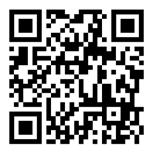

It takes a lot to make a school great - it comes with hard work and a relentless determination to strive for excellence in academics and activities as well as a strong sense of community. All good schools will offer educational and recreational facilities and opportunities for students to excel, discover their interests, and ignite a passion for learning. Truly great schools will do all that and much more - creating those unique extra touches that give students the best possible educational experience as well as lifelong happy memories of their time in school.

Naturally, those of you reading this will recognize these traits in ISB. However, believe it or not, there are still people out there in the world who don’t know what a special place ISB is! It was a task the Marketing department at ISB took to with great enthusiasm, devizing a series of campaigns to help spread the word about our school and help families decide on the right school place for their child. After considerable research, with a goal of finding one key unique selling point (USP) of the school, we finally landed on 10 - with none feeling any more important than the others. It is quite remarkable to find that many unique aspects of a school, anywhere in the world.
Students and staff participated in a series of photoshoots to create campaign posters and what a joy it was to work with a group of enthusiastic, confident individuals who truly embodied each of our USPs. The story of the campaign was to show how ISB (depicted by the warm glow of the ISB triangle) surrounds every member of our school community - not dominating, but supporting, encouraging, and uplifting. Harriett Gething, Director of Marketing, Communications and Alumni says “I realize that I had been, most probably, inspired by a TV advert that I often saw as a young child - the ‘Ready Brek kid’ - who has a warm glow after eating a hearty cereal!”
We launched the campaign in February of 2022 with giant posters at the front gates, pyramid poster units across campus, and a whole host of digital advertizements, blog posts, and stories. To add the fun ‘experiential’ piece of the marketing campaign, we commissioned an interactive neon triangle sign and encouraged the ISB community to get involved, become ‘#uniquelyISB’ and post to their favorite social media channels. When we spotted these posts, we rewarded them with cool hats and sunglasses! Members of staff, nominated by their peers for being ‘#uniquelyISB’ also received #uniquelyISB t-shirts to wear on campus with pride.
And the result? To date, this campaign has proved to be highly effective helping to drive almost 9,000 visits to our website’s Admissions section in the second semester alone and gaining almost 100 additional new students in August 2022. We are so pleased to see more families discover first hand, what makes ISB unique.


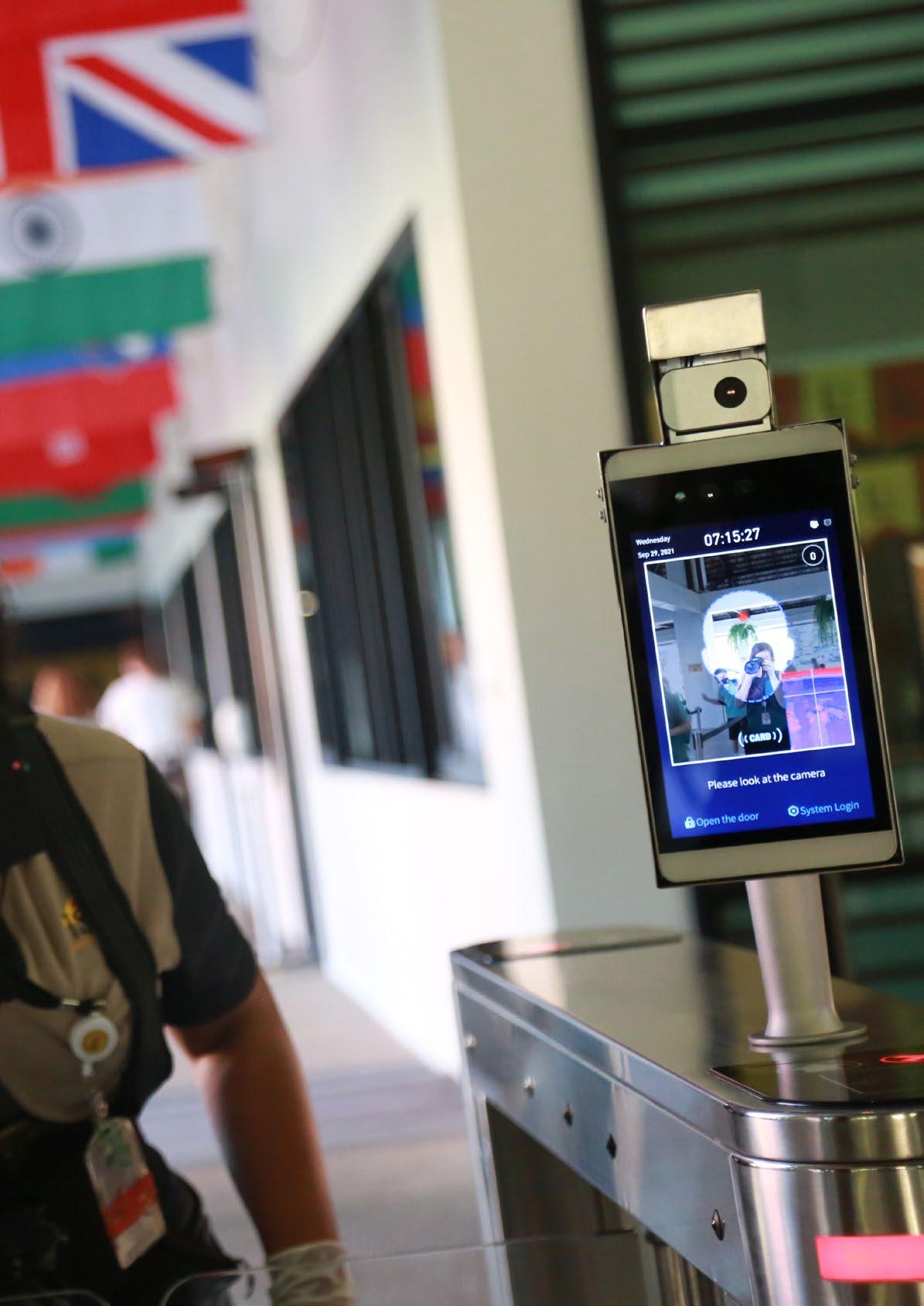
Providing a safe and nurturing environment where our students can grow and develop to their full potential is the responsibility of all ISB employees and associates. ISB is dedicated to continuous development in its safeguarding practices, overseen by the Director of Student Services in collaboration with the Director of Risk Management, Deputy Head of School for Learning, Safeguarding Committee, counseling team, and principals.
This year International School Bangkok had key safeguarding documents reviewed by Tim Gerrish, a globally recognized leader in safeguarding. The Safeguarding Committee spent the year reviewing and implementing his feedback and suggestions. This work, in addition to all the other items completed over the years, led to our successful recertification with Keeping Children Safe, a leading child safeguarding organization based in the United Kingdom.
Along with the numerous safeguarding initiatives ISB has focused on above, we continued to support the physical safety of the campus. ISB staffs a health clinic with five full-time certified nurses and a clinic coordinator who is an American/Thai Doctor. This year ISB hosted an anaphylaxis training course that was held by Bumrungrad with an Allergy and Immunology expert. During the 2021-22 school year, 180 staff completed their first-aid/CPR certification, which included AED and EpiPen training. We continue to track all incidents on campus and make modifications to facilities and procedures where we find adjustments that can support a safer learning environment.
In addition, ISB has partnered with International SOS, a global health & security assistance provider, to provide Field Trip Support. This helps the school to protect students, prevent incidents, and provide support in the event of crisis during the trips around Thailand and overseas.
ISB continues to invest in the technology and equipment needed to stay at the forefront of evolving requirements for producing safe, healthy, and productive classroom environments.
This past year we made further improvements to ISB’s CleanFlow positive pressure air systems, consistently keeping classroom PM2.5 to near zero levels, exceeding the 2021-updated World Health Organization targets of <5 µg/m3. We continue to comply with the latest Thai Ministry Of Public Health and U.S. CDC core recommendations for viral transmission risk reduction via fresh air ventilation. Additionally, equipment filtration has been upgraded with hospital-grade cartridges EN1882 certified for aerosol removal.
Importantly, this work combines the latest research in improving learning outcomes via controlling classroom carbon dioxide levels. At ISB, we consistently reduce CO2 to the levels shown to produce measurable improvements in cognitive abilities and skills, mathematical and language-based tasks, assessment tests, and exam scores.
CO2
PM2.5
Outside
ISB aims to keep the average CO2 below 800 ppm Classroom
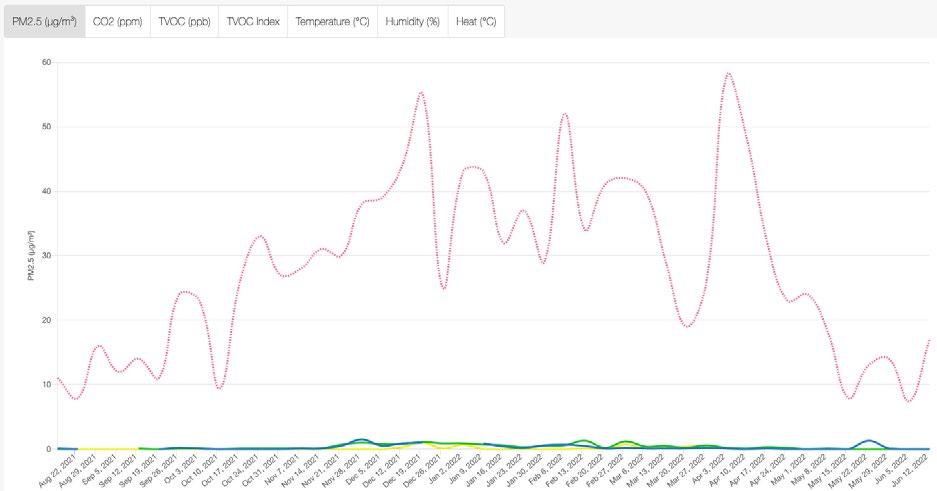

In January 2021, ISB convened the first-ever Environmental Advisory Board (EAB). This team continues to meet regularly and is made up of students, teachers, and administrators. The purpose of this team is to develop and realize the vision of making ISB a leading sustainable educational organization. The EAB will work closely with all stakeholders, including students, parents, faculty, and staff, as well as the various environmental clubs and committees on campus, to make this vision a reality. The EAB hopes that starting with the 2022-23 school year, we will be able to bring more of our community along with us on this journey.
Our ISB teachers are engaging widely with the UN Sustainable Development Goals and considering them as they design learning opportunities for all our students. These are not stand-alone learning objectives but can be incorporated and transferred to every content area. Teachers are making meaningful connections between these goals and learning.
Our students are also leaders in our sustainability work - developing and implementing several projects that are making a difference. Our High School Green Panthers club planned and organized a rooftop garden build (project-based learning with collaboration between Science classes, Design & Technology, and Math) to highlight just one of these significant initiatives. Together with Buildings and Grounds staff, our Deputy Head of School/CFO, Marc de Vries, and DELVE Planters will help construct the containers for this project with the hope that this sustainability project will continue in the future.

Several school-wide initiatives have been developed to fulfill our role in the community as a sustainable educational organization. The list below outlines many of the actions being taken at the operational levels:
1. Single-Use Materials Reduction
• 5% discount at the Grind for bringing your own cup
2. Recycling
• Recycling bins have been placed all around the school campus
3. Resource Conservation
• Cultural Center is a LEED Gold certified building with an advanced Building Management System (BMS)
• Remote sensing of classroom temperatures and air quality
• Film placed on windows and sunshades in classrooms to reduce the impact of the heat and sun
• Sensors placed on automatic water taps
4. Carbon Footprint Reduction
• 25 middle school students came together this year to help implement the rollout of solar panel systems throughout ISB - the panels will be installed in the next school year
• Elementary students designed signs for every light switch reminding people to switch off the lights
5. Reduction of Harmful Chemicals
• Non-chorine-based water sanitation system
• Environmentally friendly sanitation gel and fumigation for COVID disinfection
• UVC lighting for disinfection
6. Planting Trees
• Fruit trees planted in the Early Childhood Courtyard
• Trees planted on campus and up at our Environmental Wilderness Campus as well
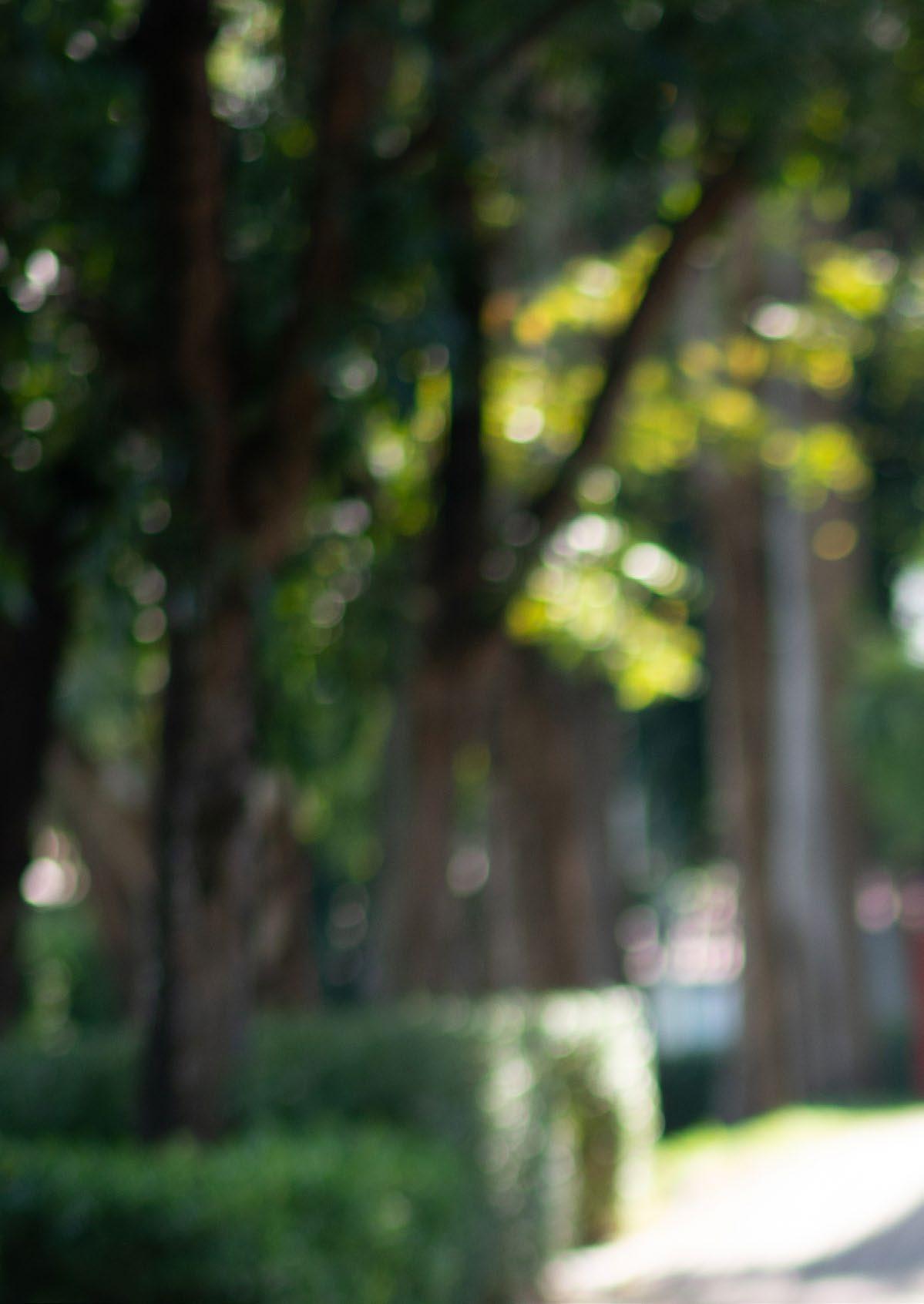

At 1610 students, our opening enrollment was relatively low due to nearly 70 of our younger students deferring enrollment until the second semester because ISB started the school year virtually. Once we returned to in-person learning we added 141 new students so enrollment recovered well and the inyear enrollment was the highest recorded in over a decade.
Our income totaled THB 1.67 billion and we realized an operating loss of THB 35 million primarily due to THB 42 million spent on COVID related expenses such as credit to returning students and the providing ATK’s to students and staff for our twice-weekly testing protocol. Nevertheless, our cash position increased by THB 31 million and ISB’s financial position remains very healthy in part due to the generous contributions we receive from donors, which was just short of THB 60 million this year.
As a non-profit organization, ISB reinvests all of its income into the school, recognizing that teachers have the single most significant impact on learning. This school year 85% of the tuition income was allocated to salaries and benefits. This investment in quality education has allowed us to attract and retain these best and brightest teachers, while maintaining a student-teacher ratio of 9 students to 1 teacher schoolwide. We invested THB 156 million in capital projects as we continue to implement our rolling 7-year facilities master plan. Capital projects included the Elementary School Cafeteria renovation, construction of Sky Park and Parkour Park playgrounds, installing new classroom doors and access control, as well as ongoing facilities improvements such as increasing our electric capacity, painting and other smaller projects.
Thank you for your continued support
“Thank you to our donors in 2021-22 for their generous support of ISB”
Arthit Boonyakieat
Boonvanichakarn Family
Chat Prompow
Chirathivat Family
Danapat Promphan
Jariyawadee Suvunditkul
Khongruangrit Family
Ms.Ariya Tangmitrphracha
Mr.Boonchai Putakotirat
Ms.Jarwee Logawitawat
Pachara Tanawongkasaem
Pamit Batra
Pete Kritanusorn Family
Phansangiam
Pimchana Khamkham and Suphakit Sae-ue
Pongsupak Vongvivat
Poopaibool Family
Print Online co.,Ltd.
Promtarawrong Family
Rojratchadakorn
Roongchat Boonyarat
Saran Leesavan
Sasayarmont Pakdipongpitchaya
Seizeeyothin Family
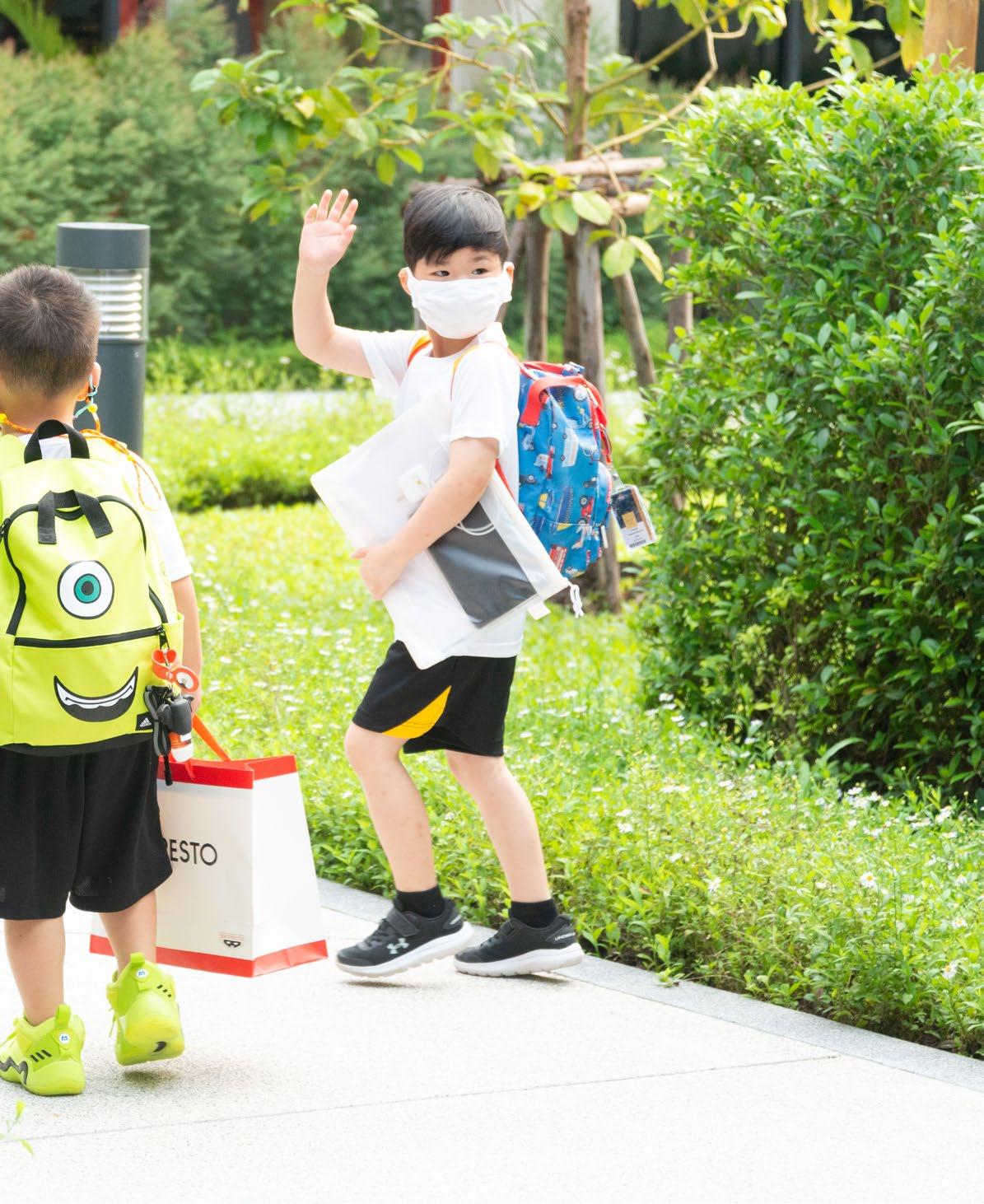
Setthisut Chetphongphan
Sunchiro Pooamorn
Suriyawanakul Family
Suthikan Pornsirkul
Tanat Tananivit
Tangmanee Family
Tantibundhit
Techopitayakul
Thantip Inpiuta
Wongsirikul
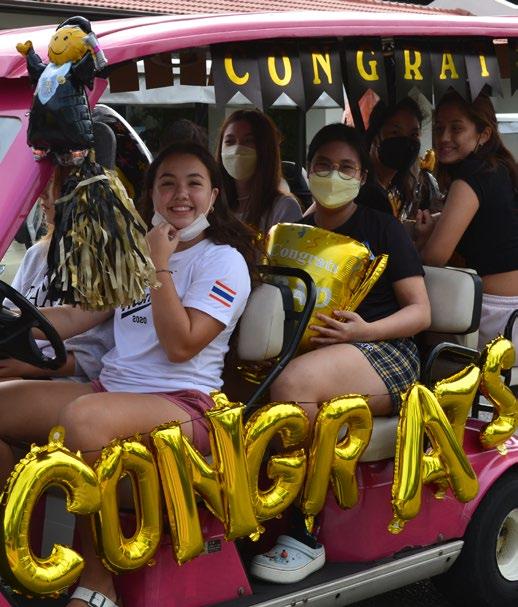
Photography: Nutdanai Pongnikorn
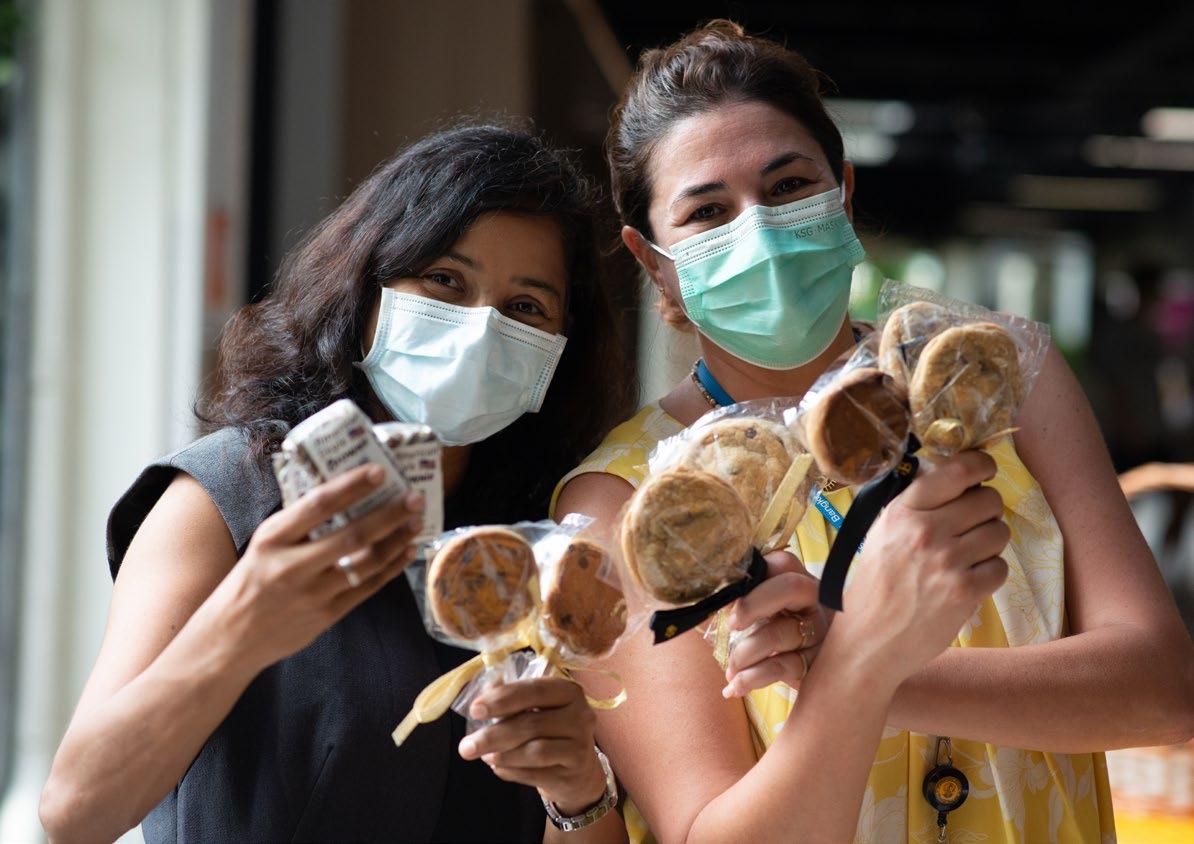
Infographics & Design: Arin Aukayanagul
Content Writers: contributing ISB Faculty and Staff
Editors: Harriett Gething, Harmony Casey, & Munchupa Sonthiruk


Tel: +66 2963 5800
Email: admissions@isb.ac.th

Website: www.isb.ac.th
